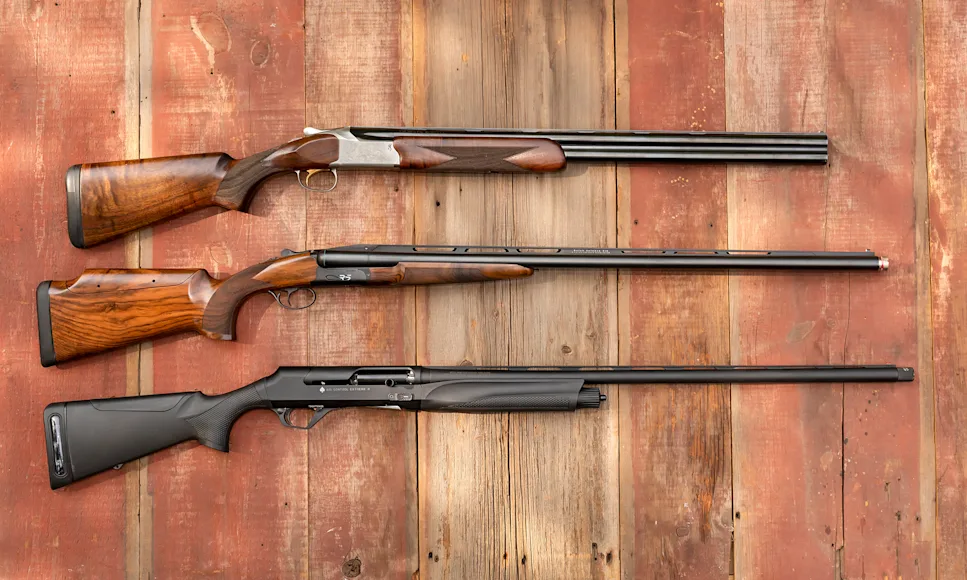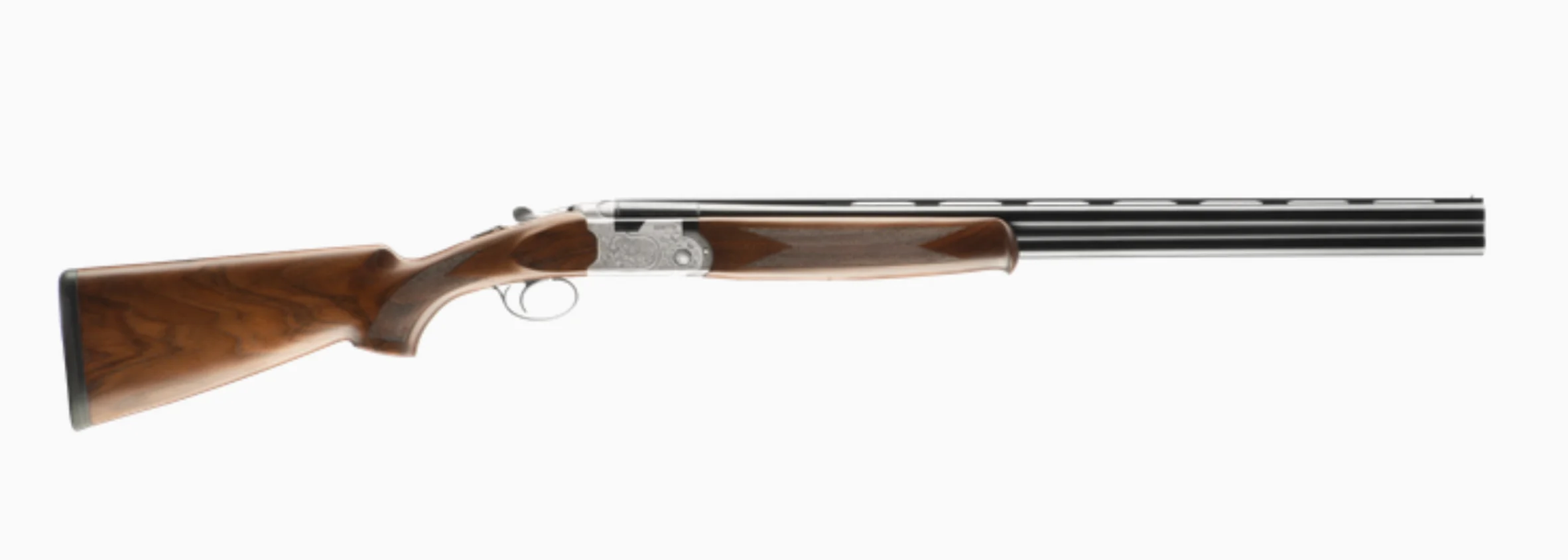We may earn revenue from the products available on this page and participate in affiliate programs. Learn more
The job of testing and choosing the best shotguns of the year is easy and fun when companies make good guns, and in 2025 they did. There was genuine innovation on display this year. There were guns with traditional lines and some with decidedly modern ones. There were great values and guns to splurge on. Four of the guns were side-by-sides, and it’s nice to see horizontal doubles hanging in. Over-unders were well represented, too. The traditional pump gun appeared in this year's test, in a very interesting new form.
I checked trigger pulls, weight, balance, ergonomics, fit and finish, all of which are quantifiable or semi-quantifiable traits. Shotguns are instinctive arms, too, and that means you have to shoot them to see which guns you become one with, and which are just guns. I shot all of them at skeet and 5-stand and was able to sneak in a little hunting with two or three. I tested with light target loads for reliability and heavy hunting loads to see how hard they kicked. I shot them for point of impact, and patterned them. Finally, I tallied up all the scores for seven different categories to get a total score (out of 100) and made my picks the best shotguns of 2025. Here they are, along with reviews for every gun I tested.
Best Overall: Browning Citori 825 Field
Best Target Gun: Beretta 688 Performance Sporting
Best Splurge: Fabarm Infinite RS
Most Innovative: Benelli SBE 3 A.I. BE.S.T.
Best Value: Retay ACE-R
Best Overall: Browning Citori 825 Field
Score: 87
Why It Made the Cut: It takes restraint not to fix a gun that wasn't broken. Browning's light tweaks to the already great 725 include a restyled forend of which I approve and an even better trigger. The result is a good-looking, practical, versatile O/U.
Specs
Length: 45 3/4” with 28-inch barrels
Weight: 7 pounds
Barrel: 28-inch flat vent rib, white front and mid-beads, 3 Invector Plus DS II chokes
Action: Break-action O/U
Trigger: 3 pounds, 8 ounces
Capacity: 2
Finish: Silver-Nitride-finished receiver, engraved with gamebirds and scroll
Stock: Oil-finished gloss walnut
Chambering: 3-inch 12-gauge
Price: $3,319
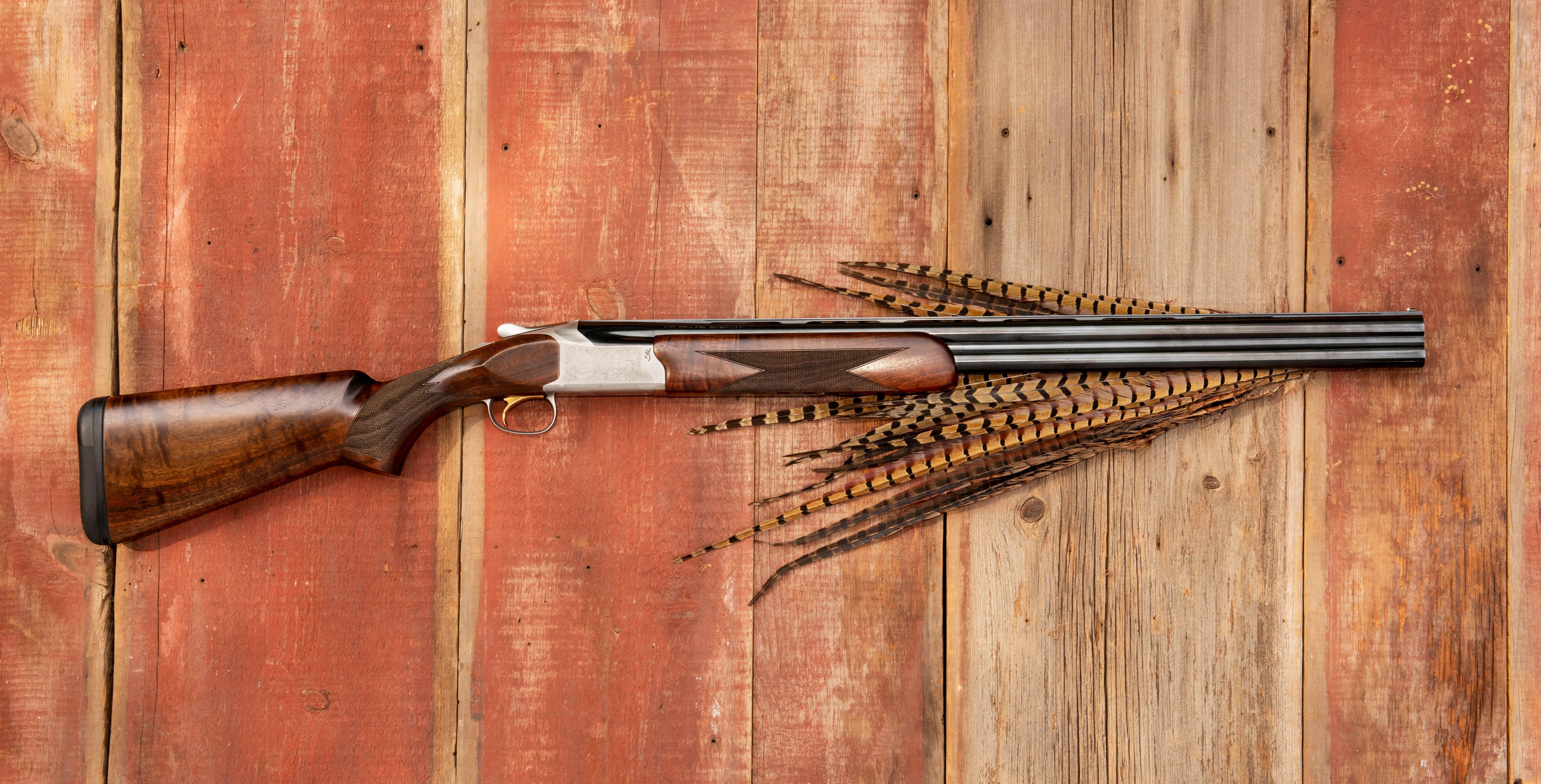
Pros
Excellent trigger
Good fit and finish
Points well
Cons
Palm swells don’t belong on field guns
Only available in 12-gauge field and sporting so far
Recognizing that the Citori 725 wasn’t broken, Browning gave it the lightest of upgrades, making it just enough better that, as the 825, it became my favorite new gun of 2025. I carried it through the end of a memorable pheasant season back in January and shot it at the range, too. I especially liked the gun in the field, where it was easy to shoot and no burden to carry.
In 2014, the Browning Citori 725 addressed the height and weight problems the original Citori, inherited from the Superposed. With the 725, Browing engineers found ways to trim the receiver down to a lower profile. They took weight from the barrels, too, resulting in a gun that was ¾ of a pound lighter and much livelier than the original Citori. The inertia reset trigger of the Citoris and Superposeds gave way to a mechanical version as well.
Every decade or so, guns need refreshing, even guns as good as the 725. To become the new 825, it received new styling mostly by way of a more classically shaped, rounded forend, as well as some streamlining of the top level and lines around the breech. I would bet the game scenes are now laser-engraved while the older versions were rolled and sometimes hand-chased, but they still look pretty good. The grip has a palm swell, which I don’t think belongs on a field gun, and it also has an Inflex recoil pad on the butt of the oil-finished, Grade II/III walnut stock that dampens recoil. The barrels are overbored and have Browning’s lengthened “VectorPro” forcing cones, too, and the DS II chokes.
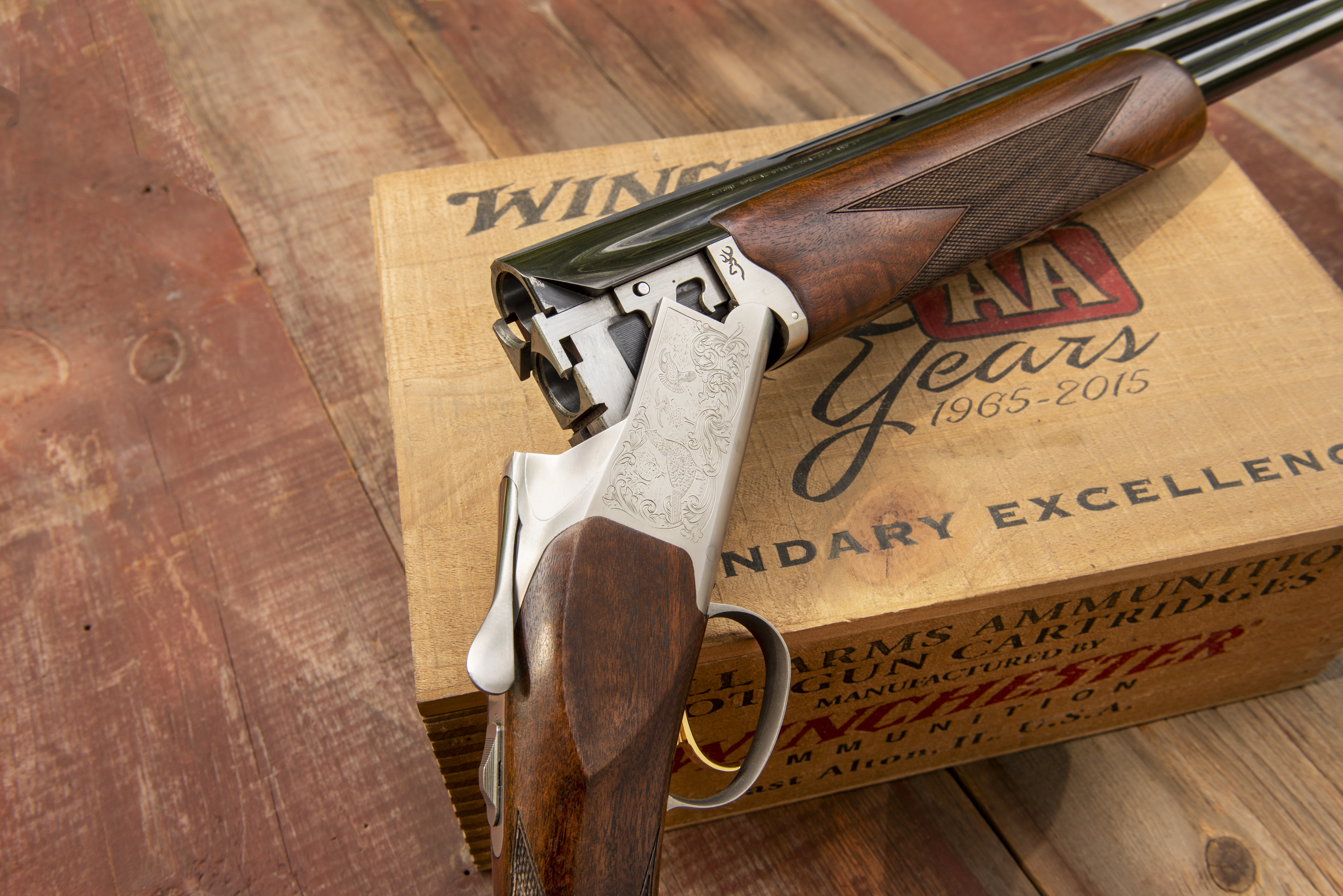
From a bench rest, my test gun centered the pattern about two inches high at 40 yards, which is practically dead-on. I also patterned a load of Boss Steel Reserve 3s, and it shot a 60% pattern at 40 yards with the Modified choke in place.
Everything worked as it was supposed to, and the new Firelite 2 trigger broke at a clean 3 1/2-pounds, a pull so nice, even I noticed it. Weighing an even 7 pounds, my test gun was just right for a field 12-gauge. At a price point that puts in the aspirational range that inspired John Browning to design the Superposed and that has always been the Citori’s niche, the 825 is a worthy successor to all the Citoris that came before it.
Related: Check out a full review of the 825 Field here.
Best Target Shotgun: Beretta 688 Performance Sporting
Score: 86
Why It Made the Cut: The laminate-stock 688 stands out on any gun rack, and it’s a standout in its price range. The gun is Beretta’s entry-level competition gun, with features that will take you a long way in competition.
Specs
Barrels: 30- or 32-inch
Action: Break-action, Inertia reset
Trigger: Single selective
Stock and Forearm: Gray-black laminate
LOP: 14.75 inches, trigger adjusts for length
Weight: 8 pounds, 5.5 ounces (tested) with 30-inch barrels
Chambering: 3-inch 12-gauge
Price: $3,599
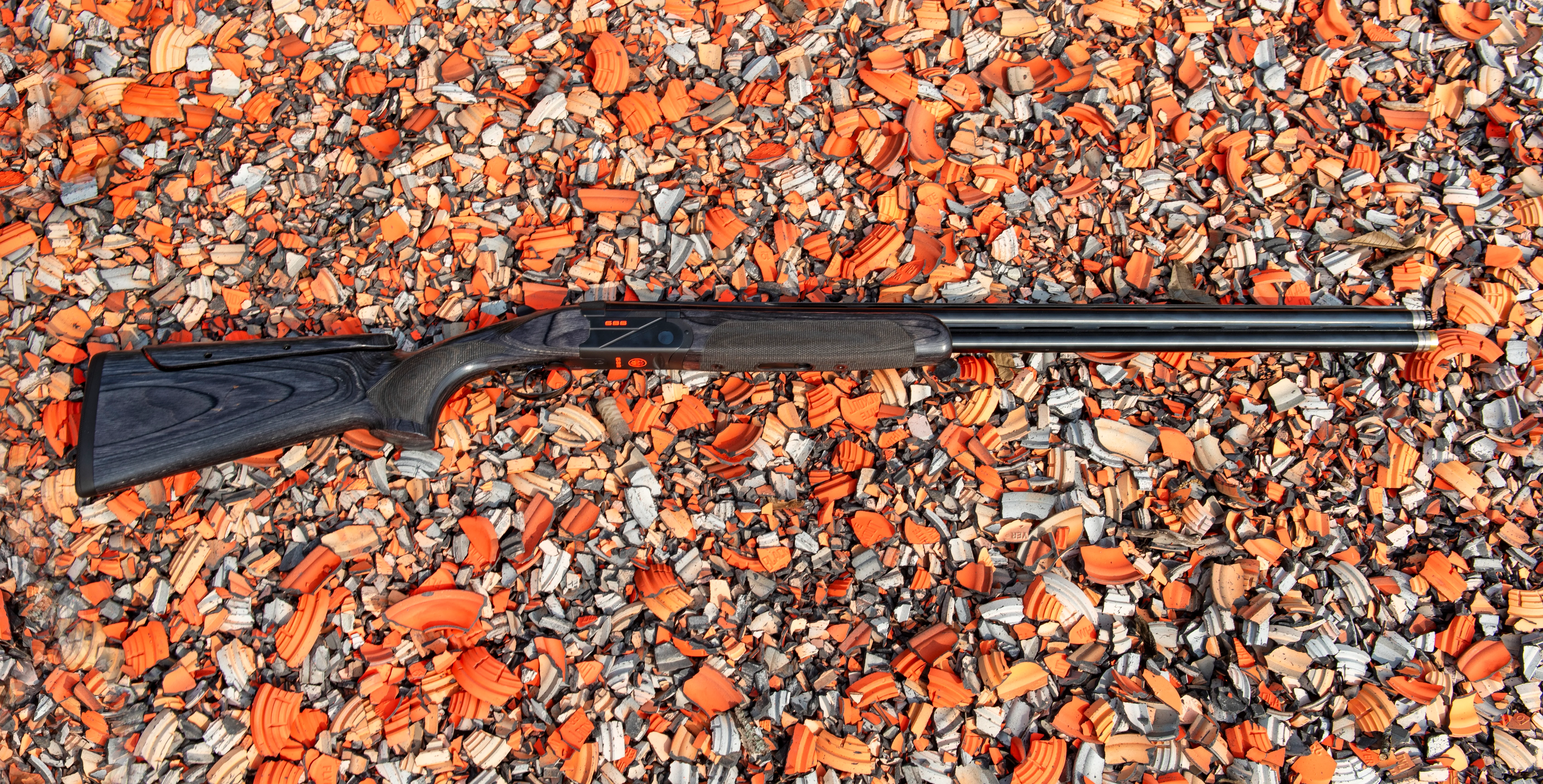
Pros
Excellent weight and balance
Adjustable comb and trigger length
Weatherproof stock
Distinctive looks
Cons:
Lacks replaceable shoulders
The new 688 Performance Sporting can be your first target gun, or your only target gun, depending on how far you want to go in sporting-clays competition. It has all the features target shooters want in a platform that will stand up to seasons of hard use. The laminate stock is heavy in order to absorb recoil, and it’s stable in any weather. It’s a good choice for a target gun. While not everyone will love its appearance, I think it looks good, too, in a non-traditional way.
The 688 is built on a wider, heavier frame, with the gun's weight concentrated between the hands by the thick receiver. It has a rounded forend, as target guns should, an ambidextrous palm swell so left-handers also get the grip and recoil-reduction benefits, and Beretta’s B-Fast adjustable comb, a feature preferred by the vast majority of shooters.
The gun has the traditional solid, low-profile Beretta lockup consisting of two pins protruding from the breech face and fitting into recesses just above the ejectors. It’s a durable, proven system. This gun does lack the replaceable shoulders of high-end Beretta target guns, but it will last forever and can still be rebuilt.
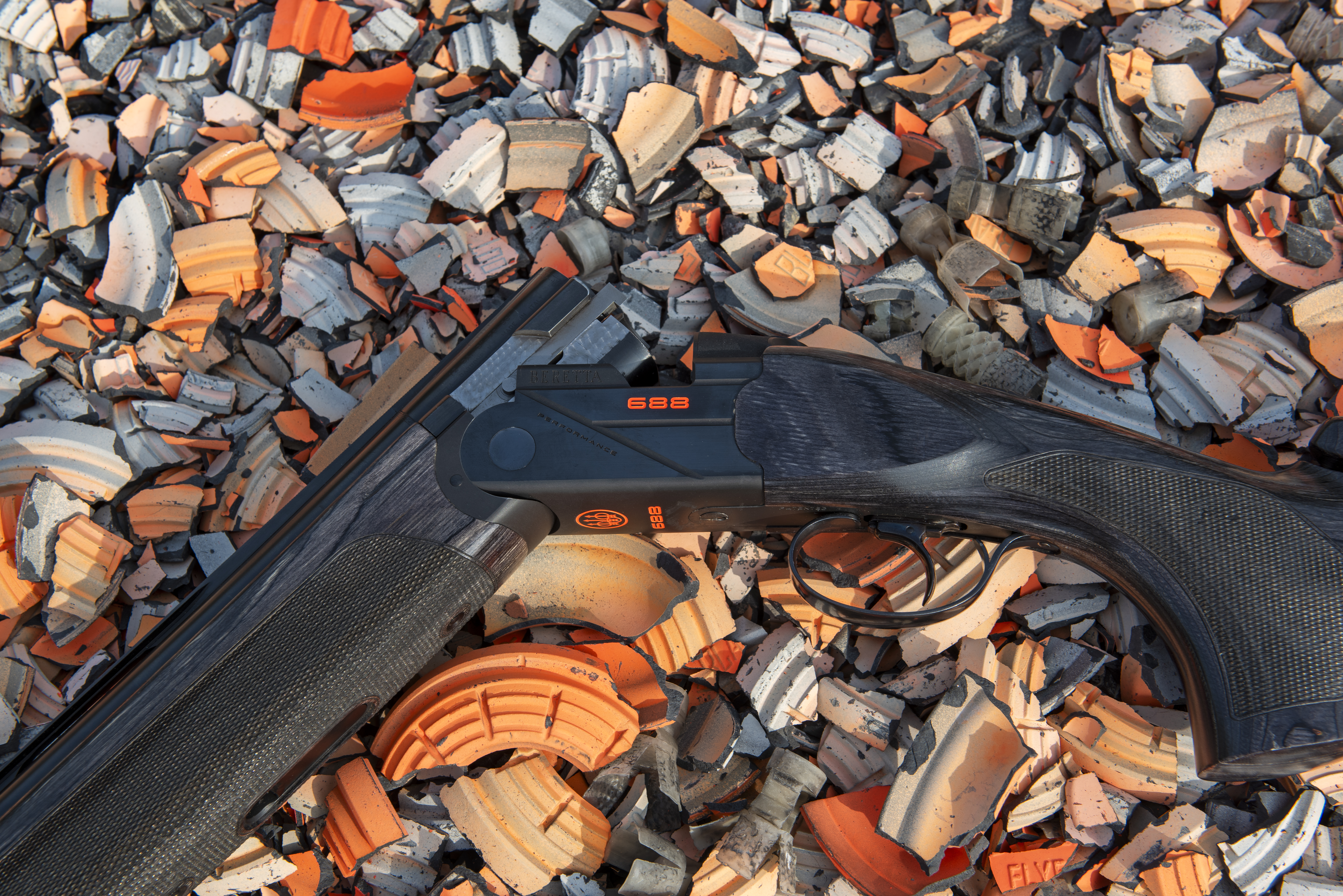
The barrels have ventilated top and mid-ribs and are available in 30- and 32-inch lengths. My test gun was a 30, and it weighed 8 pounds, 6 ounces. It balanced on the trunnions out of the box, and that could be changed with the optional weight kits available. I thought it felt just right, and it shot to point of aim, with both barrels impacting quite close together. The gun shot excellent patterns with Browning 7 ½-shot target loads, producing a good 75% at 40 yards through the IM tube. The trigger was crisp and broke at 5 pounds. The trigger also adjusts for longer and shorter fingers. It seemed like a gun that should be easy to shoot, and it was. Recoil with those same stout Browning loads was quite manageable, and I enjoyed shooting the gun. The 688 comes with a hard case, five extended chokes, and a screwdriver and wrench for the adjustable comb. A women’s stocked “Vittoria” model is also available.
Best Splurge: Fabarm Infinite RS
Score: 86
Why It Made the Cut: Fabarm’s high-rib Infinite RS target gun combines the traditional lines of a side-by-side with the modern features of a race gun, and it all works. It’s fun to shoot, easy to look at, and you can’t help wanting one even if you don’t need it.
Specs
Length: 50.25” with 32-inch barrels
Weight: 8.5 pounds with 32-inch barrels
Barrel: 30- or 32-inch raised hand-detachable aluminum rib, white front bead, nickel mid- bead, five Exis HP chokes
Action: Break action side-by-side
Trigger: 4.5 pounds
Capacity: 2
Finish: Satin/matte steel with enamel decoration
Stock: Semi-deluxe Turkish walnut
Chambering: 3-inch 12-gauge
Price: $6,044.50
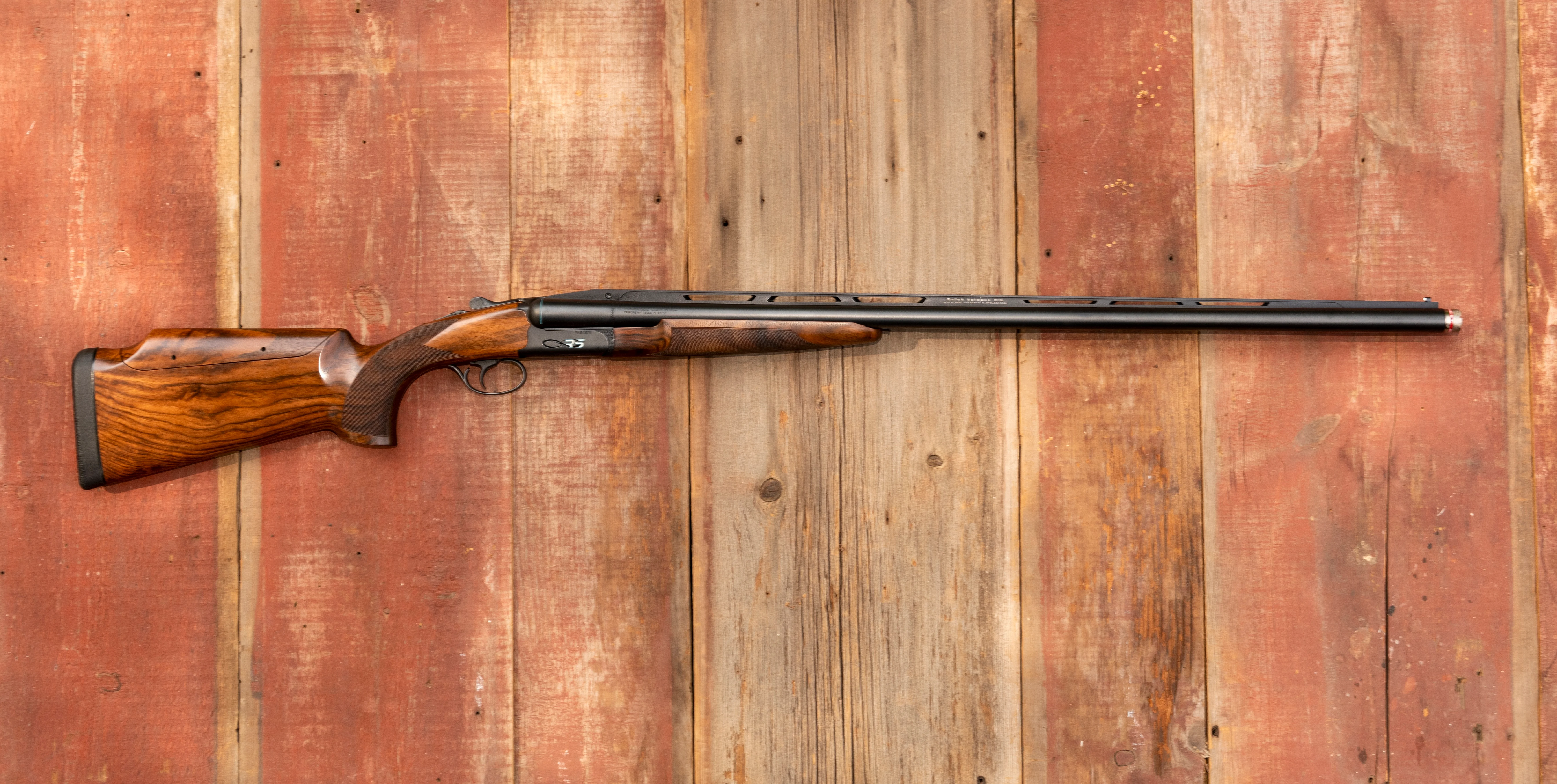
Pros
Genuine purpose-built target gun
Raised rib for O/U-like sight picture
Excellent fit and finish
Cons
Styling may not be for everyone
Built for a narrow purpose
As side-by-side sporting-clays events become popular, some people want a dedicated gun. That’s a small niche market, but the Infinite RS's appeal extends beyond that. It’s distinctive, it’s easy to break targets with, and if you want something different and fun in a target gun, it’s very tempting.
With the Infinite RS , Fabarm puts a new, modern twist on a side-by-side action that it has been building for years, and one that's often seen at live-pigeon rings on the Continent. That strong, four-lug action (most side-by-sides have two lugs) forms the basis for a sporting gun with long barrels, extended chokes, an adjustable Monte Carlo stock, and a very high target-style rib. The fit and finish are very good. The decoration is contemporary, too, with blue and white enamel accents.
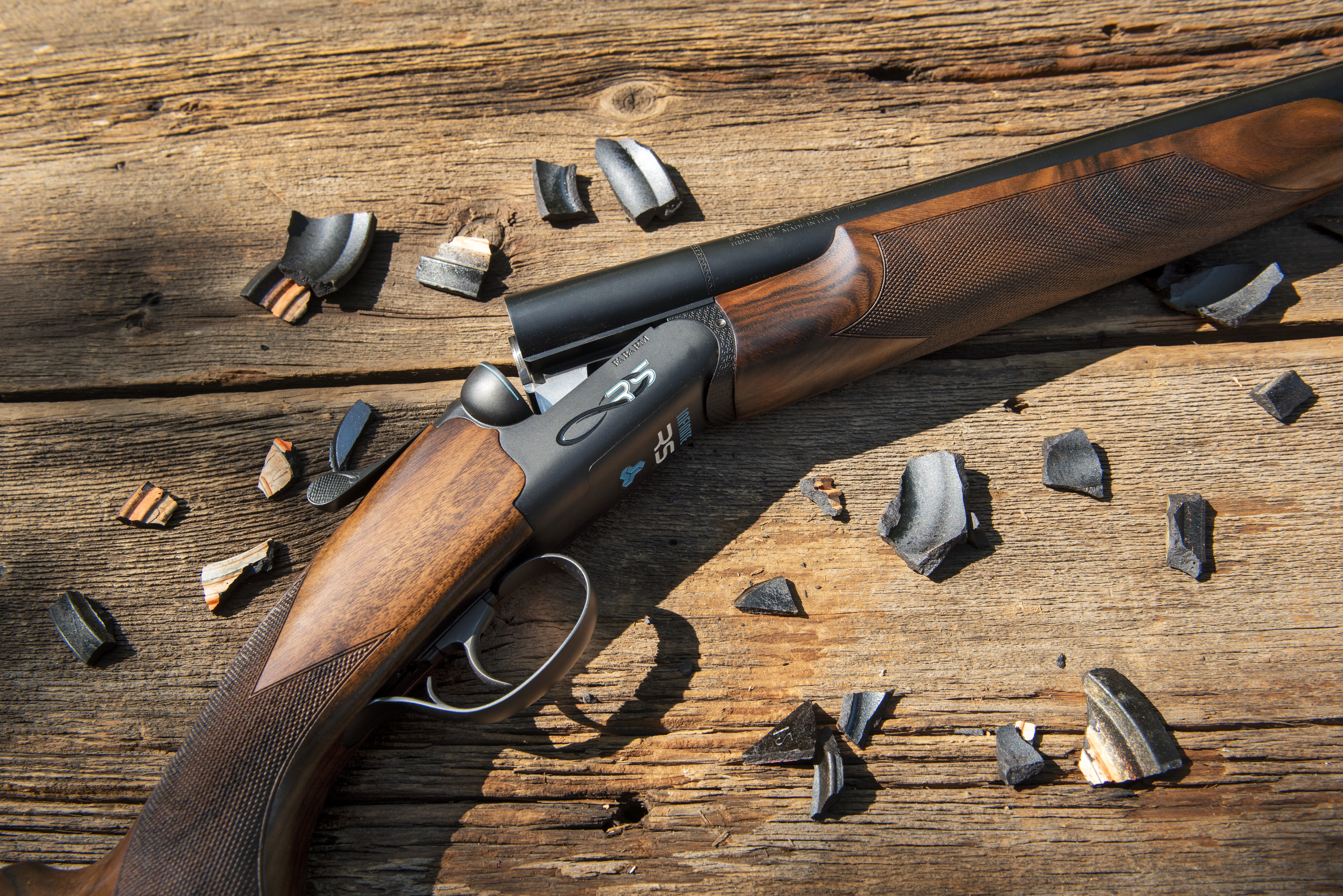
Most important, it shoots. I picked the gun up at my FFL holder and took it straight to the sporting course, where it smashed targets with ease. It has the heft of a sporting gun and a tall, 10mm rib that gives you a sight picture not much different than an O/U's. Sessions on the skeet field verified the gun’s shootability. I could shoot it from both a high- and low-gun start. Obviously, $6,000 is a lot for a gun that’s either for special events or for fun, which is the only thing that keeps the Infinite RS from being completely irresistible.
Related: Check out a full review of the Fabarm Infinite RS here.
Most Innovative: Benelli SBE 3 A.I. BE.S.T.
Score: 81
Why It Made the Cut: Benelli is all about technology, and the SBE 3 A.I. BE.S.T. is their latest, highest-tech inertia gun. The A.I. barrel actually delivers on its promise of improved ballistics.
Specs
Length: 49”
Weight: 7 pounds with 28-inch barrel
Barrel: 28-inch barrels with stepped carbon-fiber vent rib, orange bead, five extended Advanced Impact System chokes
Action: Inertia semiauto
Trigger: 6 pounds, 14 ounces
Capacity: 3+1
Finish: Gunmetal BE.S.T.
Stock: Optifade Timber camo synthetic with ComforTech 3
Chambering: 3 1/2-inch 12-gauge (tested), 3-inch 20-gauge
Price: $3,199
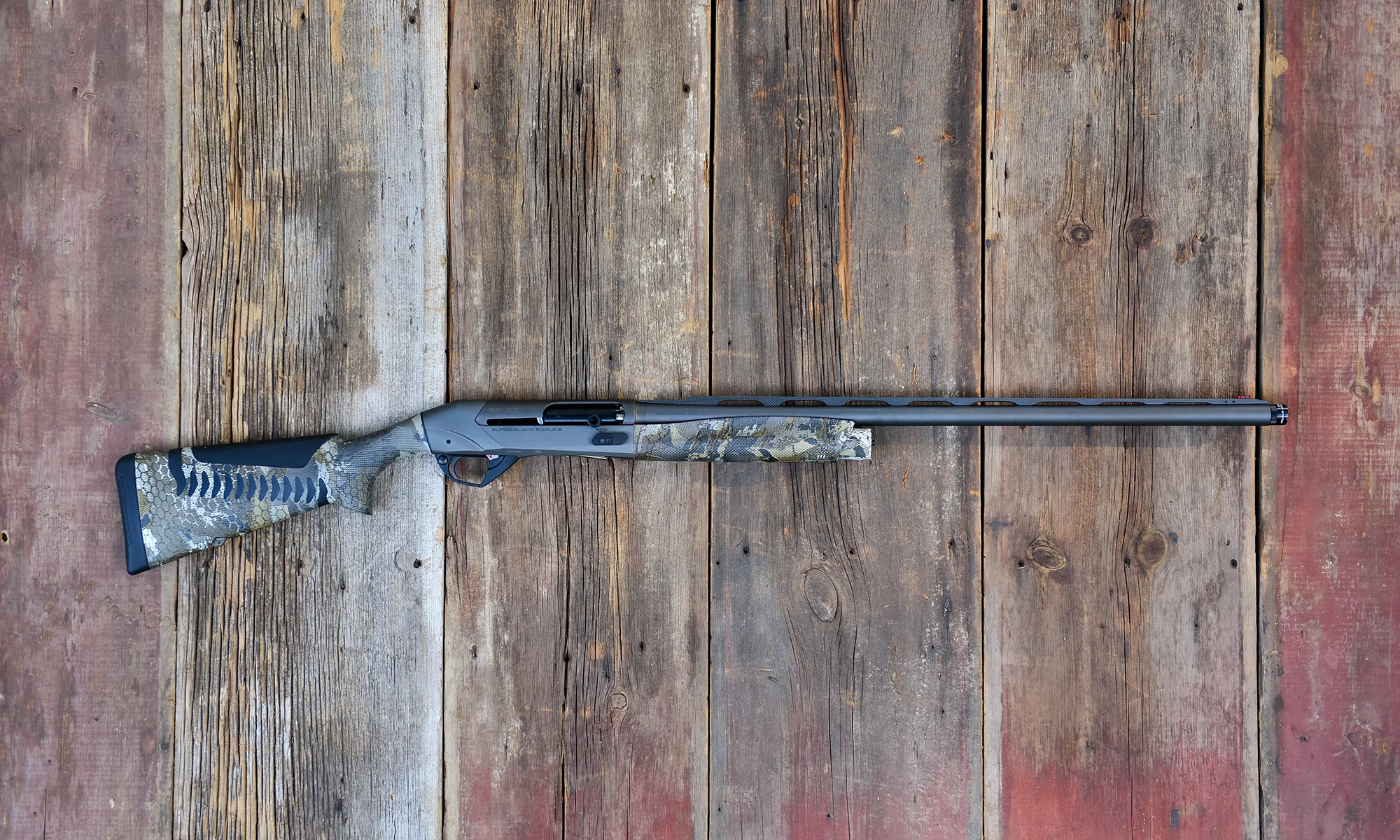
Pros
A.I. barrels deliver increased penetration
Shootable
Cycled light loads well
Less recoil with ComforTech
Cons
Heavier trigger
Stiff to load
Benelli introduced the A.I. (Advanced Impact) barrel on the Ethos line. This year finds A.I. where it truly belongs, on the SBE 3, the state of the inertia-gun art. The SBE 3 has all of Benelli’s high-tech innovations: the Easy Locking Bolt, the ComforTech stock, and the BE.S.T. finish. Now it adds A.I. The A.I. system, through overboring, extra-long choke tubes, and barrel-smithing voodoo, claims to increase downrange energy and penetration. And it does.
When I shot both loads of 2 shot and BBx2 into gelatin at 45 yards, the A.I. barrel penetrated about 10% deeper when compared to a standard Benelli M2 with a Crio choke. This is progress, especially at a time when TSS and bismuth prices are going up, and we’re taking another look at steel. That 10% didn’t match some of Benelli’s claims for the gun, but it’s a solid improvement, and there is no tradeoff other than a fatter barrel and a higher price tag.
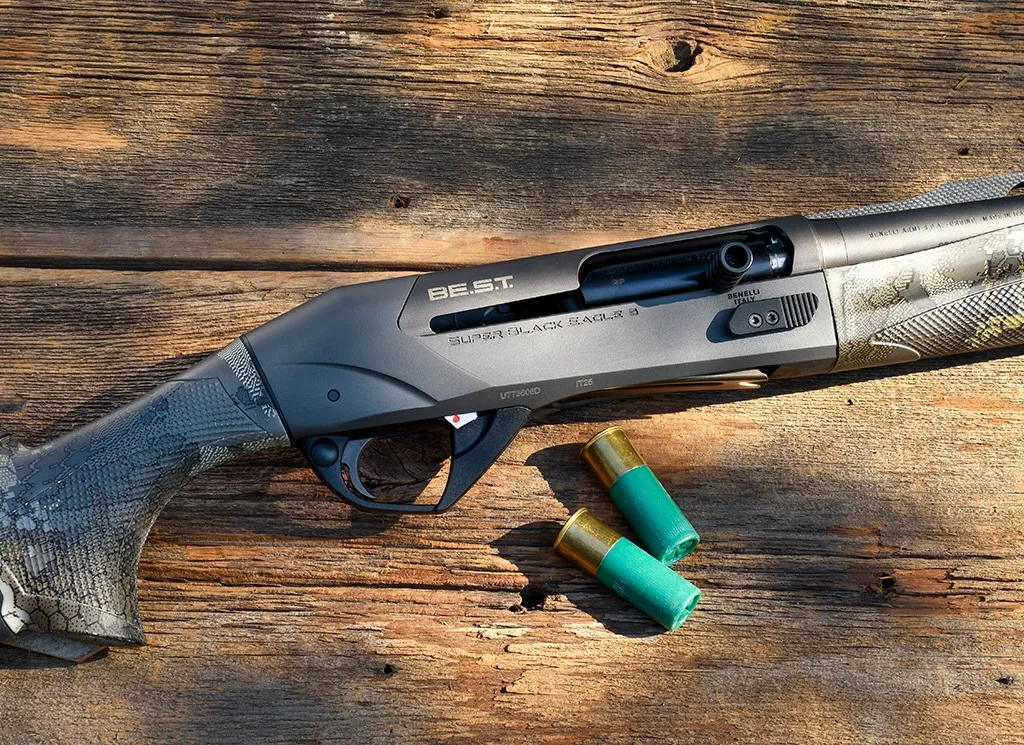
Other than that bigger barrel (to accommodate the larger bore dimensions and new extended choke), the A.I. SBE 3 looks the same as other SBE 3s with an Optifade Timber synthetic stock, gray BE.S.T. coating, a carbon-fiber rib and the ComforTech Plus soft rubber inserts in the stock. The gun did pattern high, about 70/30 at least, but it was easy to hit with. The A.I. barrel shot 65% patterns at 40 yards with an Improved Modified choke and Kent Fasteel 2.0 3-inch 2s. Recoil was definitely less than with my non-ComforTech M2, although I primarily experienced that as less vibration.
The Easy Locking bolt increases Benelli’s already famous reliability. The only fault I found with the gun is that it lacks the softer magazine spring and shell latch of the new M2s and Montefeltros. It’s not a big deal until the weather turns cold and fingers get numb, but Benelli should include it on their priciest gun. All in all, this is most feature-packed inertia semiauto you can buy.
Related: Check out a full review of the SBE 3 A.I. BE.S.T. here.
Best Value: Retay ACE-R
Score: 81
Why it Made the Cut: While the world may not need another Turkish inertia gun, it can certainly use the new ACE-R, which shoots and handles well and includes a number of worthwhile features, all for about $1,000.
Specs
Length: 49 1/2” with 28-inch barrels
Weight: 7.26 pounds (12-gauge with 28-inch barrel)
Barrel: 26- or28-inch flat vent rib, small fiber-optic bead, five flush-mount and two extended chokes
Action: Inertia semiuato
Trigger: 5 pounds, 11 ounces
Capacity: 3+1 (gun is compatible with mag extension)
Finish: Black, Mossy Oak Bottomland, Realtree Max-7
Stock: Synthetic
Chambering: 3 1/2-inch 12-gauge (20- and 28- due fall 2025)
Price: $1,049
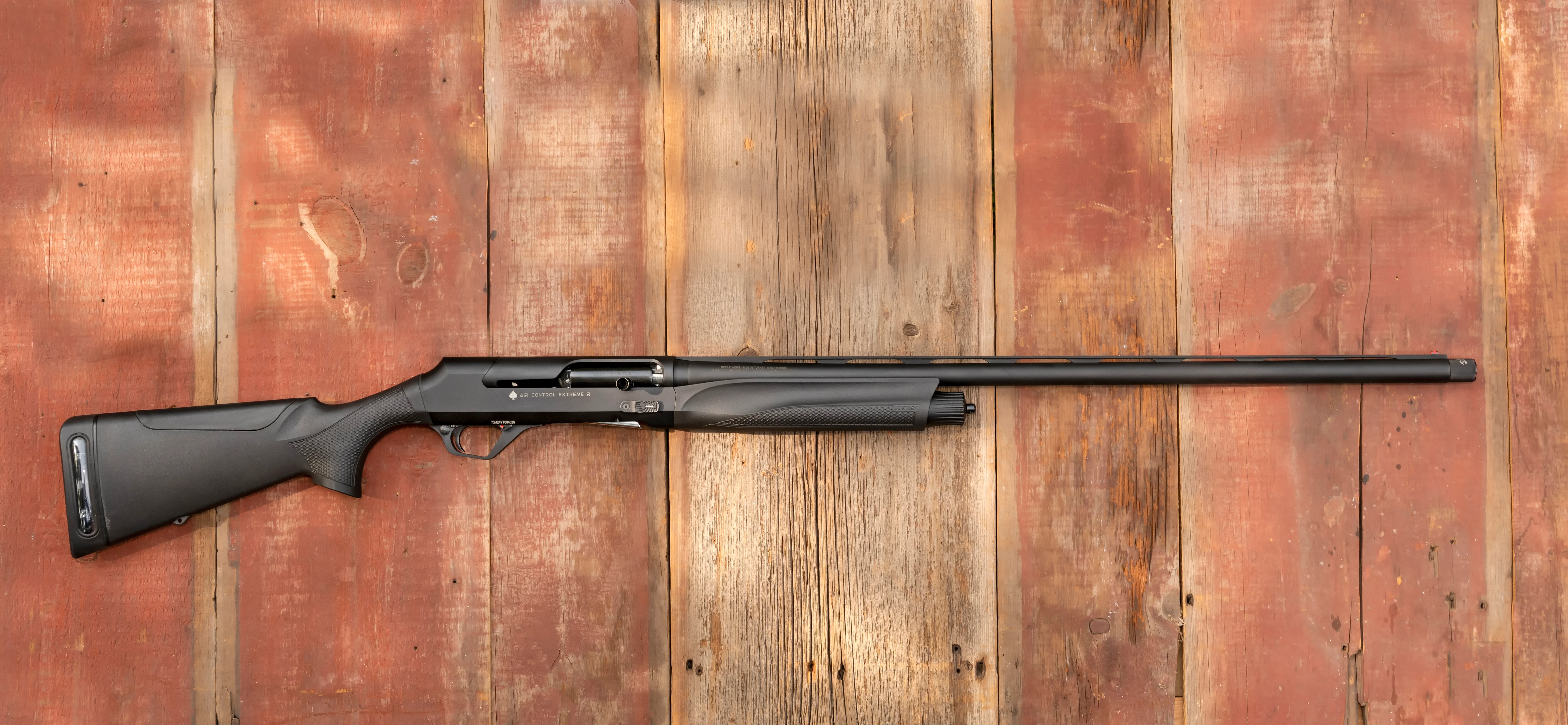
Pros
Inertia plus bolt
Reversible safety
Threaded for Crio-choke
Improved light-load cycling
Cons
Bolt handle is stupidly large
Finish may be prone to scratching
With the new ACE and the ACE-R (tested) inertia semiautos, Retay USA fits a pair of winners between the top-of-the-line Masai Mara and its entry level Gordion. Both are mid-priced semiautos with good function, fit and finish, and very nice handling qualities.
The ACE has a standard-profile, rounded receiver, while the ACE-R has a modestly hump-backed receiver. My sample ACE-R gun weighed in a 7.26 pounds, with a noticeable weight-forward balance accentuated by a very slim forend that gave the barrel a nice feeling of density in my front hand without being ponderous. In fact, the minute I picked this gun up, I thought I’d be able to shoot it. I liked the hump-back lines, and if you don’t, just get the regular ACE. I did find the Airy pad, with its clear, running-shoe inspired panel to be quite ugly, and the bolt handle is enlarged to the point of obnoxiousness. Otherwise I liked the looks.
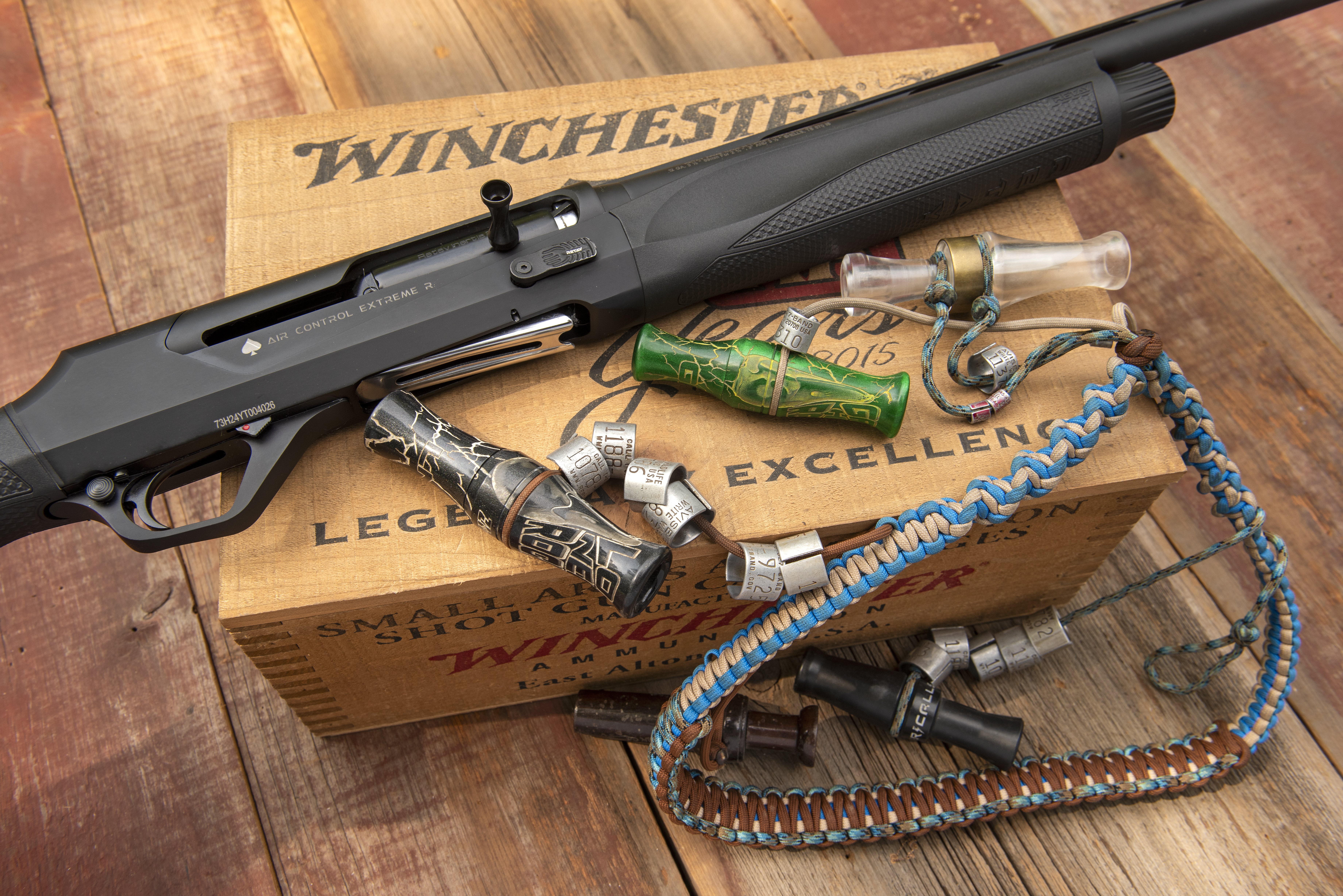
It shot a perfect 50/50 above and below point of aim for me. The trigger broke at a reasonable 5 pounds, 11 ounces. The new Airy recoil pad and a soft comb did a good job of reducing recoil. To test Retay’s claim of improved performance with light loads, I started hot, with 1 1/8-ounce, 1200 fps loads and worked my way down. The gun cycled perfectly with 1 ounce, 1180 fps shells, but nothing lighter. The new guns, unlike previous Retays, have reversible safeties, and they are threaded for the Benelli Crio-choke system in place of Retay’s Mara Chokes.
My ACE-R came with seven chokes including flush Crio chokes in Cylinder, IC, Modified, IM, and Full, as well as an extended Improved Modified and a “Retay by Trulock” .699 long-range waterfowl choke. That long-range tube, combined with Retay’s deep-drilled barrels and long forcing cones, produced 78% patterns at 40 yards with Boss Steel Reserve 3s and the .699 extended tube.
Both the ACE and ACE-R guns share the Inertia Plus bolt of other Retays that does not bump out of battery easily, as is the case with other inertia guns. I was able to shoot a couple of September teal with the gun, and I did mange to scratch the metal finish somehow without doing anything abusive to the gun. I might spend the extra $100 for a camo-dip finish if I were buying one. That’s a small complaint, and this gun is a great value at $1049 in black, $1149 in camo.
Related: Check out a full review of the Retay ACE-R here.
Fabarm Autumn Elite
Score: 84
Why It Made the Cut: A classy side-by-side bird gun, the Autumn Elite shoots as good as it looks. An upgrade on the original Autumn, it helps fill the wide gap between inexpensive side-by-sides and truly high-end guns.
Length: 45.25 inches
Weight: 6 pounds, 10 ounces (with pistol grip and beavertail forend)
Barrel: 28-inch barrels, silver bead, swamped rib, five Inner HP chokes
Action: Break-action side-by-side
Trigger: 4 pounds, 12 ounces
Capacity: 2
Finish: Blued barrels, silver-nitride receiver with gold inlays
Stock: Deluxe oil-finished Turkish walnut, available in pistol grip or straight grip
Chambering: 3-inch 20-gauge
Price: $6,594.50
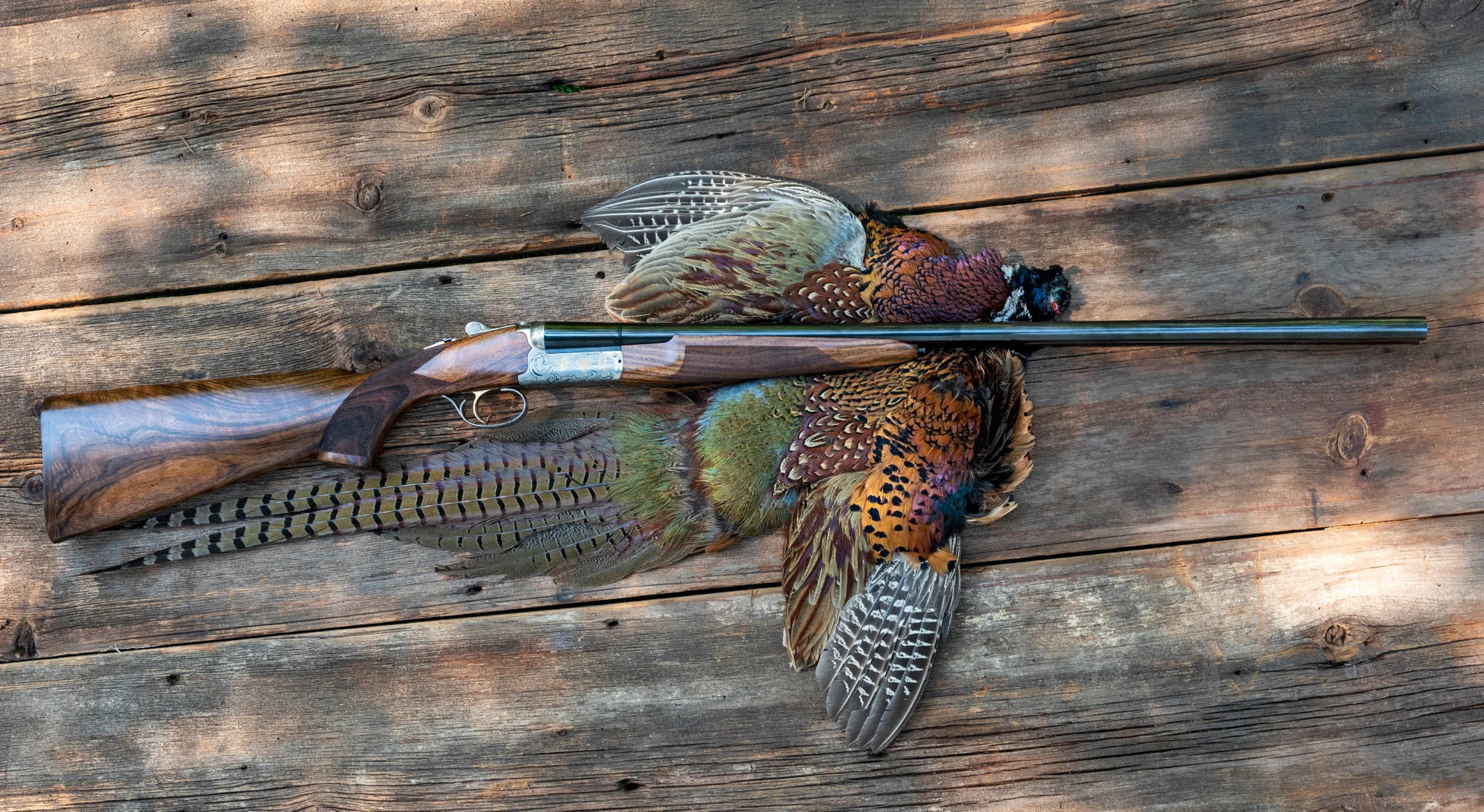
Pros
Upgraded wood and engraving
Hand-filling grip and forend
Cons
Only 20-gauges available
Fabarm’s Autumn Elite is built around the same four-lug action as the Infinite RS, but the two guns could not be more different. As its name suggests, the Autumn is made with our favorite season in mind. You don’t need to look at the gold-inland game scenes on the silvered receiver to know it’s primarily an upland gun. A deluxe Turkish walnut stock is perfectly inletted to the scalloped frame on my test gun, and I couldn’t find a cosmetic flaw anywhere. And the quail, grouse, and pheasants inlaid on the silver-nitride receiver look better than the camera shows, too, and their habitats are well-rendered.
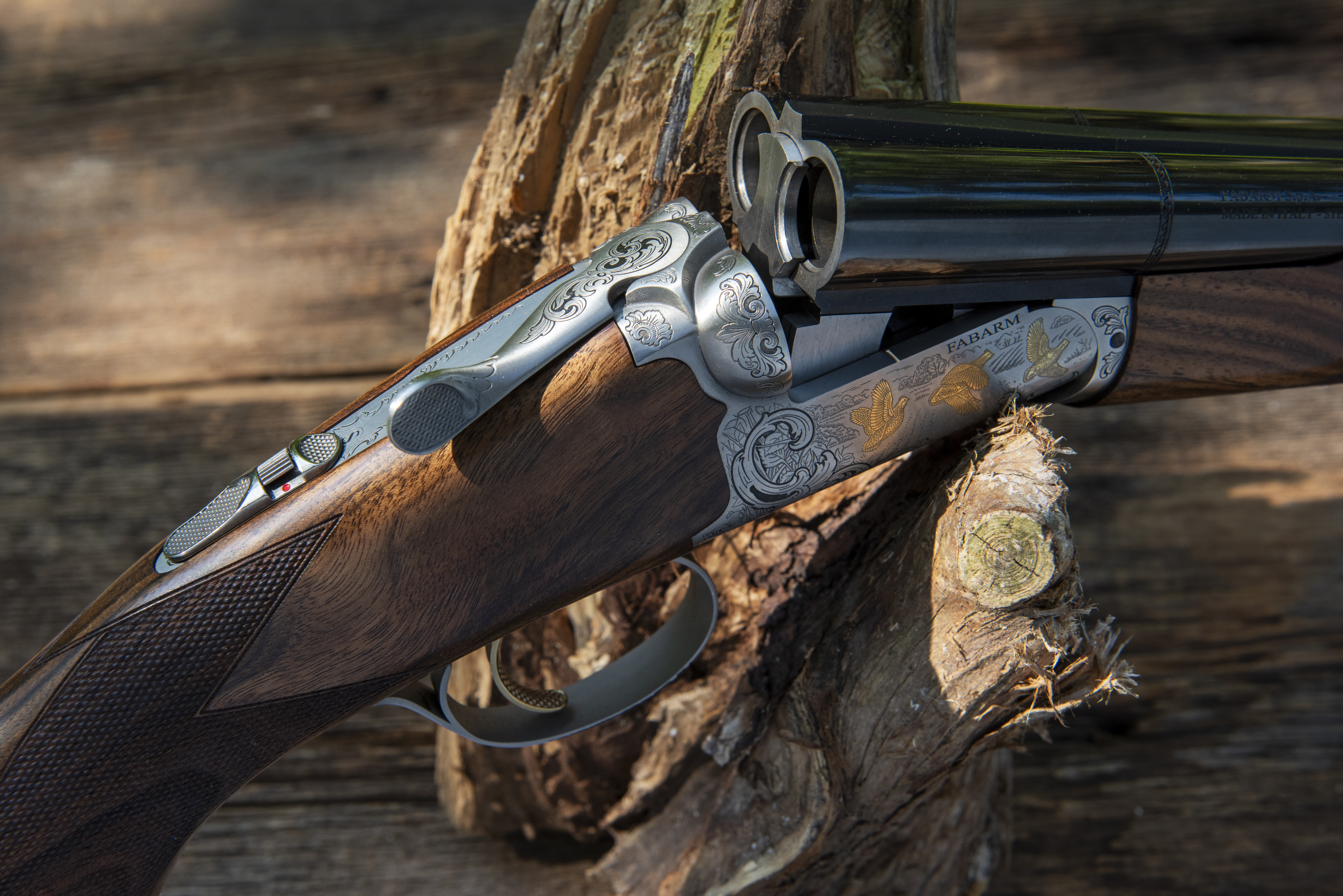
At 6 pounds, 10 ounces with 28-inch barrels in 20-gauge, this gun isn’t a super lightweight, but it’s a good compromise between “light enough to carry” and “heavy enough to shoot.” It comes with five flush choke tubes, which, like all Fabarm tubes, are made in-house. The barrels are, in Fabarm tradition, proofed extra-high and bored according to the Tribore dimensions that do generate mild increases in velocity. The guns come in either pistol grip/beavertail or straight grip/splinter configurations.
Related: Read a full review of the Autumn Elite here.
Dickinson Plantation Grade
Score: 82
Why It Made the Cut: Classy, well-finished, and a lot of gun for the money, the Dickinson Plantation now gives you a choice between one trigger or two on its side-by-side.
Length: 45.5” with 28-inch barrels
Weight: 6 pounds, 15 ounces with 28-inch barrels in 12-gauge
Barrel: 26-, 28- or 30-inch blued barrels with raised solid rib, brass bead, and five thin-wall chokes
Action: Break-action side-by-side
Trigger: 6 pounds, 12 ounces
Capacity: 2
Finish: Satin wood/matte steel, with enamel decoration
Stock: Semi-deluxe Turkish walnut
Chambering: 3-inch 12-gauge, 16-, 20-, 28- and .410 available
Price: $2,495
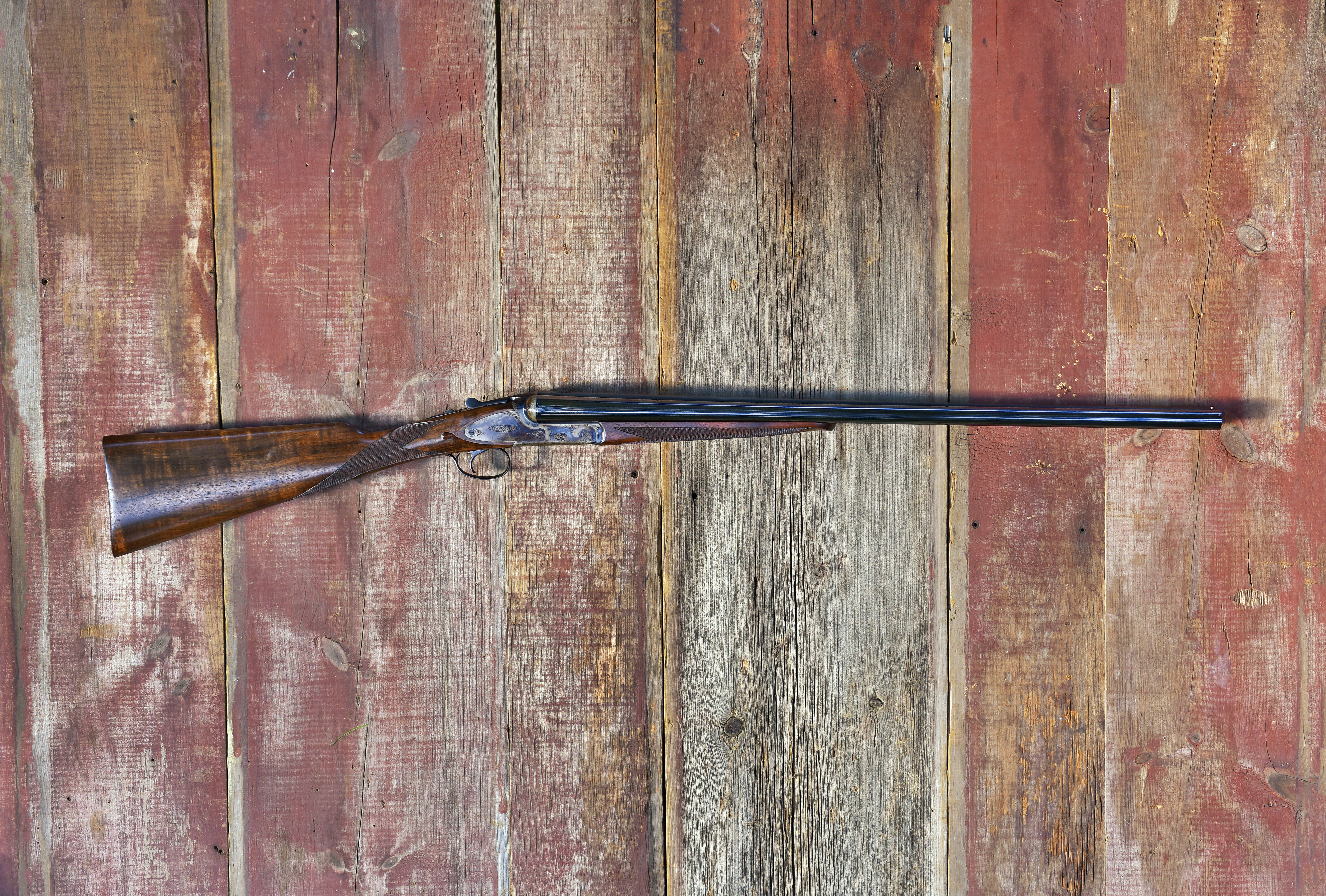
Pros
Good trigger pull
Beautiful finish
Classic lines
Cons
Stiff safety
The single-trigger Dickinson Plantation Grade offers a classic side-by-side at a reasonable price to the existing Dickinson lineup of double-trigger guns. This single-trigger gun is perfect for those of us who can’t remember to switch from front to back or back to front when there are birds in the air.
Made by Akus/Komando, one of the best Turkish gunmakers, these guns have well-finished, often spectacular walnut and true bone-and-charcoal case colors. The guns come in all gauges, on scaled frames. My test gun was a 12, with 28-inch barrels. It had a straight grip and splinter forend with a Schnabel flare on the end, and it had one trigger. From the checkered wooden butt to the flush-mounted, thin-wall, notchless choke tubes, the gun has elegant lines and features. The walnut on my test gun was relatively straight-grained, with some figure, and very handsome. All the lines were right—except for the Schnabel tip, which does not belong—including well-executed walnut teardrops aft of the sideplates. Wood to metal fit is good, not perfect, especially around the sideplates, but even to me, who is picky about wood-to-metal, it’s not a dealbreaker at the price.
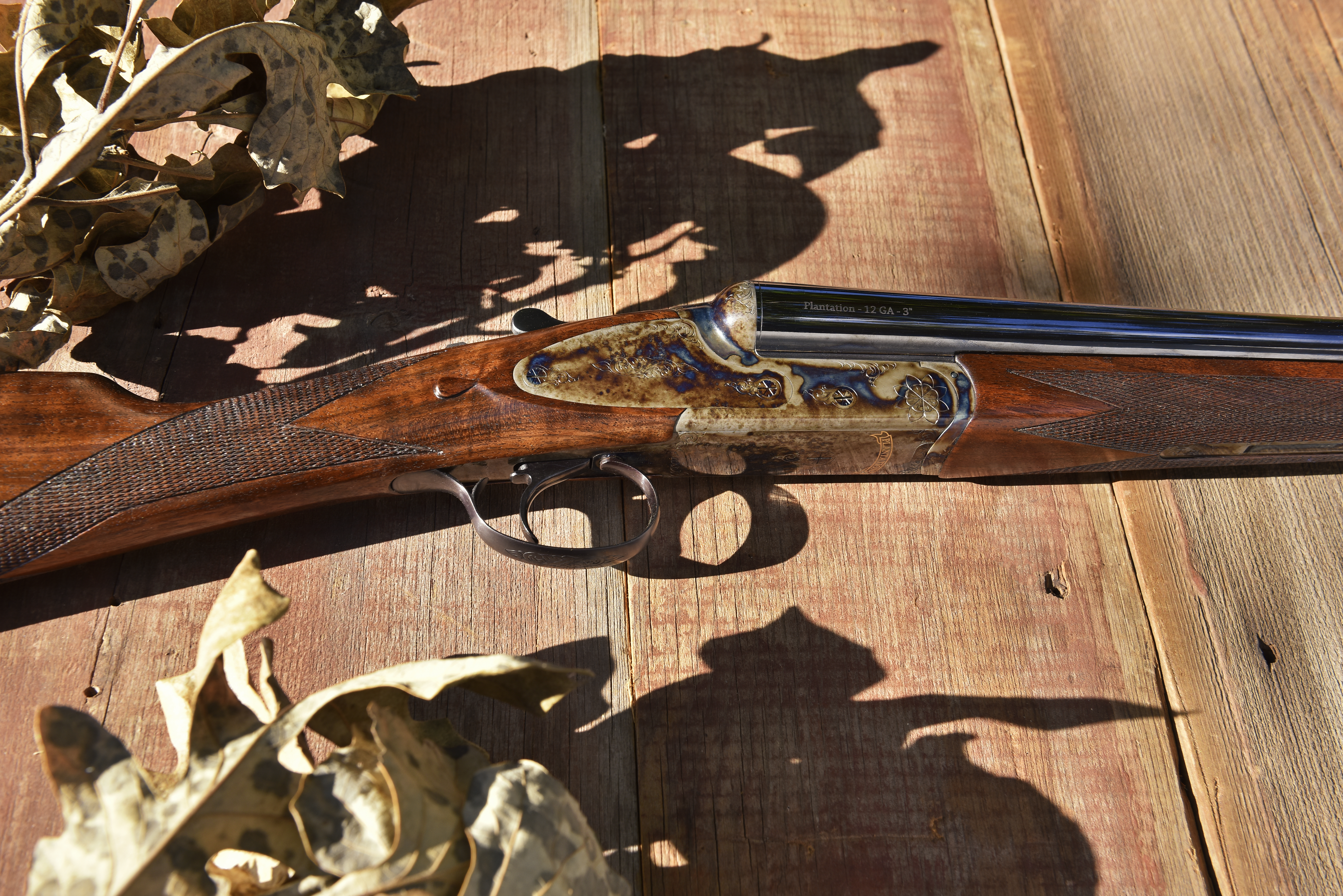
The gun weighed about half an ounce shy of 7 pounds, with the weight nicely concentrated between my hands. In a pleasant surprise, the trigger pull was a reasonable 6 pounds, 12 ounces, which is good considering the heavy pulls on many Turkish guns. The Browning-style safety/barrel selector was quite stiff and needs a gunsmith’s attention, but this is a small thing. And while many are leery of single triggers on side-by-sides, this one functioned fine through skeet, 5-stand, and the first many shots of the new dove season.
Related: Read a full review of the Dickinson Plantation Grade side-by-side here.
Beretta 686 Silver Pigeon I
Score: 81
Why It Made the Cut: You can't go wrong with a 680-series Beretta and shooters around the world know it. The restyled Silver Pigeon features an updated choke system and retains the indestructible design of the 680 line.
Length: 49”
Weight: 7 pounds, 1 ounce with 28-inch barrels
Barrel: 26- or28- (tested) or 30-inch barrels narrow vent rib, small fiber-optic bead, Beretta Optima HP chokes
Action: O/U
Trigger: 5 ½ pounds
Capacity: 2
Finish: Blued barrels, silver receiver with floral/scroll engraving
Stock: Satin-finished walnut
Chambering: 3-inch 12-gauge
Price: $2,849
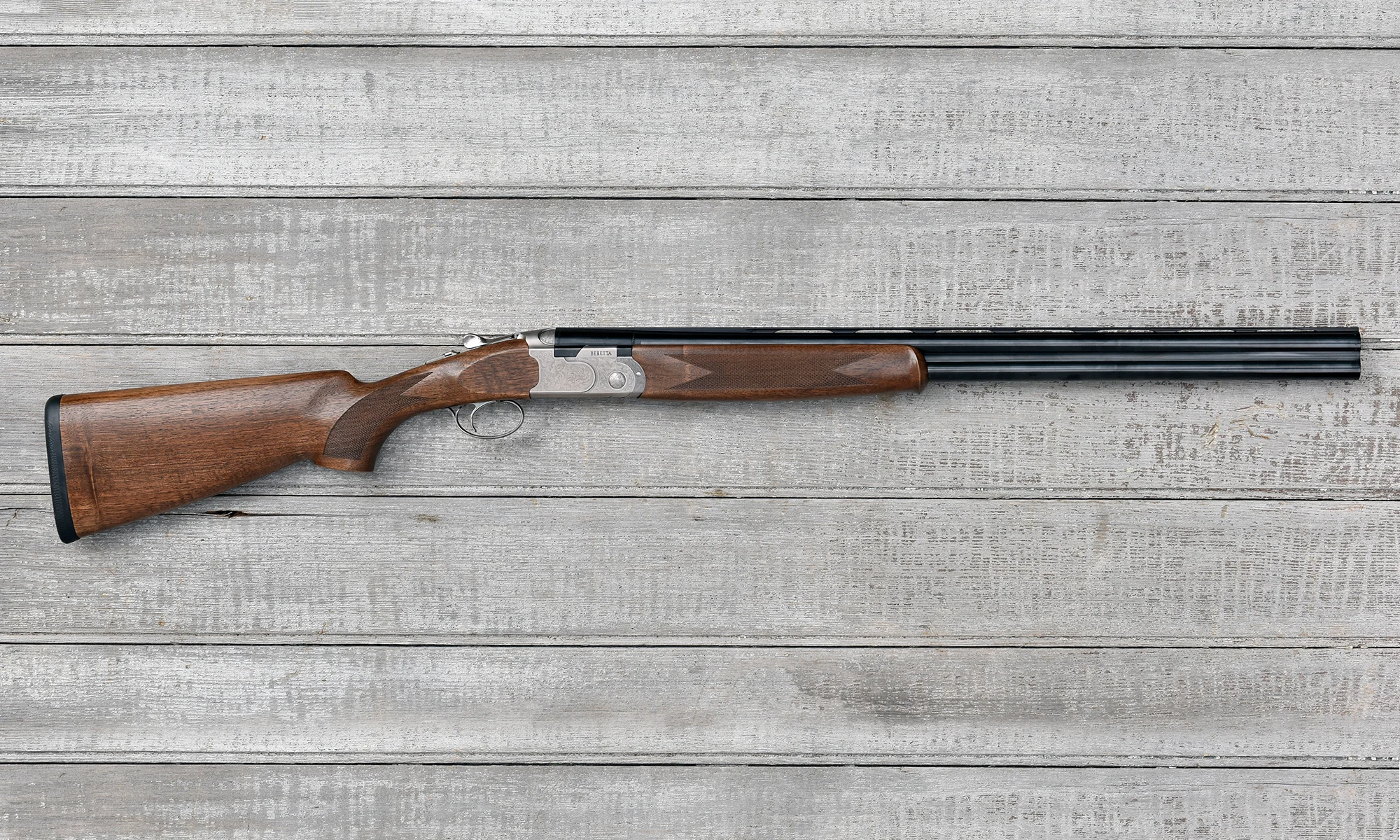
Pros
Lightweight
Proven Beretta design
Cons
Plain wood finish
Beretta’s Silver Pigeon undergoes a makeover for 2025. It’s an affordable, rock-solid, shooting O/U that’s been around for almost 50 years. Popular the world over, it’s priced to be a quality O/U that almost anyone can save and stretch for.
Part of the makeover involved updating the barrels to Beretta’s “Steelium” profile and Optichoke system. The top lever is apparently redesigned, and the pin that releases it has been moved from the side of the breech face to the top. This, Beretta says, makes the gun open more easily. Maybe it does, but I never found it hard to open. On the other hand, the safety button, like the safety on so many Beretta 680-series guns, is very stiff, but that’s easy enough for a gunsmith to smooth.
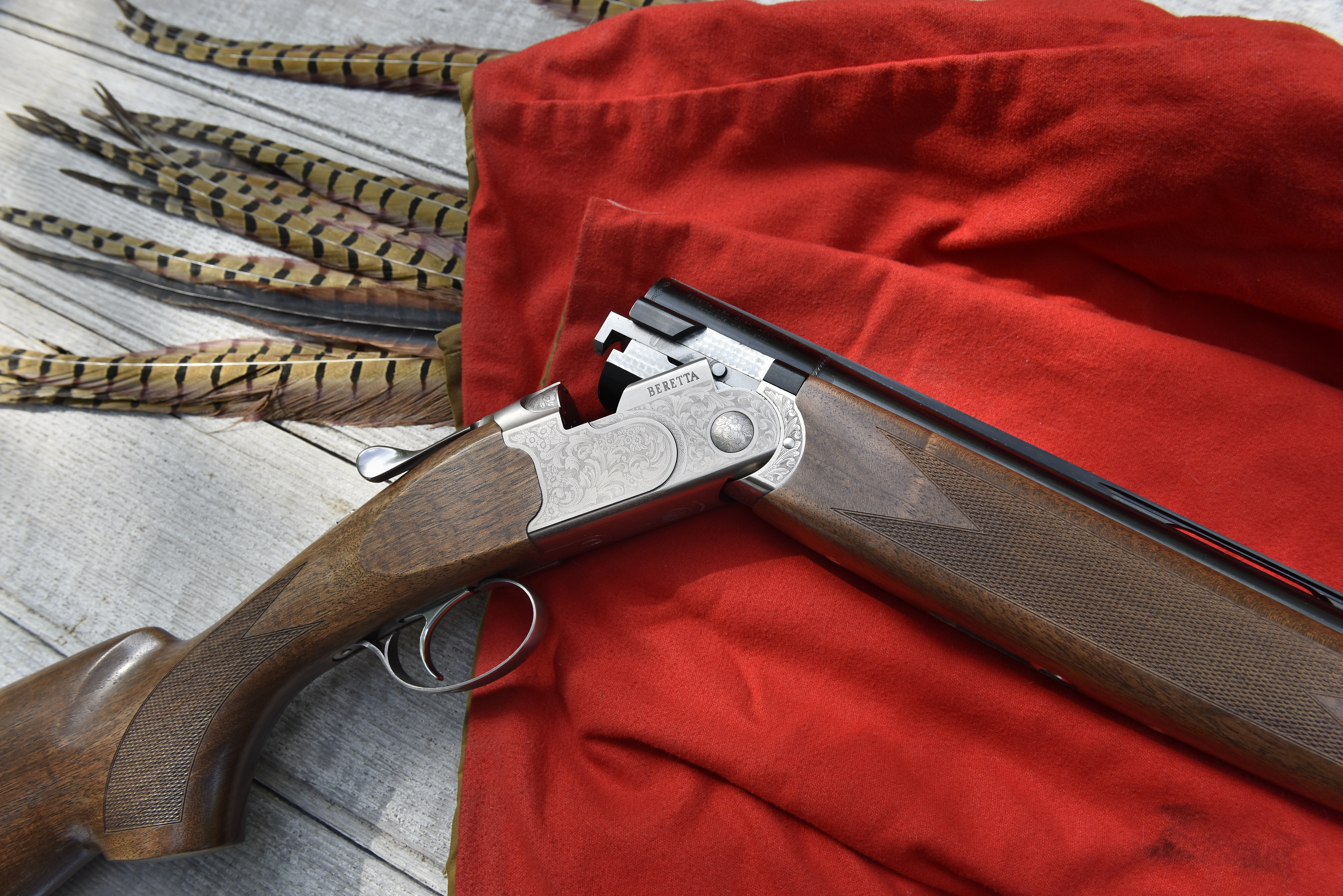
Cosmetically, the gun looks as if part of its redesign included some cost-cutting, which is understandable, given the affordable price. The wood is fairly plain, with a matte finish that does little to make it pop. The gun has a new laser engraving pattern. While it is shallowly-cut like many laser patterns, it looks better than most.
The gun retains the positive attributes of the 686: moderate weight (7 pounds, 1 ounce in a 28-inch 12-gauge) and a low-profile receiver that aids instinctive pointing. I found the gun easy to swing on clays, and the balance point just ahead of the hingepin helped, too. It shot to point of aim, as well. If I was in the market for all-around hunting gun, I could overlook the Schnabel and the plain wood and happily shoot this latest version of the Silver Pigeon.
Related: Check out a full review of the new Silver Pigeon here.
Beretta Ultraleggero Kick-Off
Score: 78
Why it Made the Cut: The Ultraleggero’s unique weight-saving design came at a price in recoil. So Beretta has added the Kick-Off to ease your pain, and it makes this one of the few O/Us with stock shims.
Length: 45.75”
Weight: 7 pounds, 3 ounces with 28-inch barrels
Barrel: 26- or28-inch barrels, nickel bead, no mid-rib, five Optima HP flush-mounted chokes
Action: Break-action over/under
Trigger: 5 pounds, 12 ounces
Capacity: 2
Finish: Blued barrels, matte steel frame, scroll-engraved, with plastic inserts
Stock: Semi-gloss walnut
Chambering: 3-inch 12-gauge
Price: $3,259
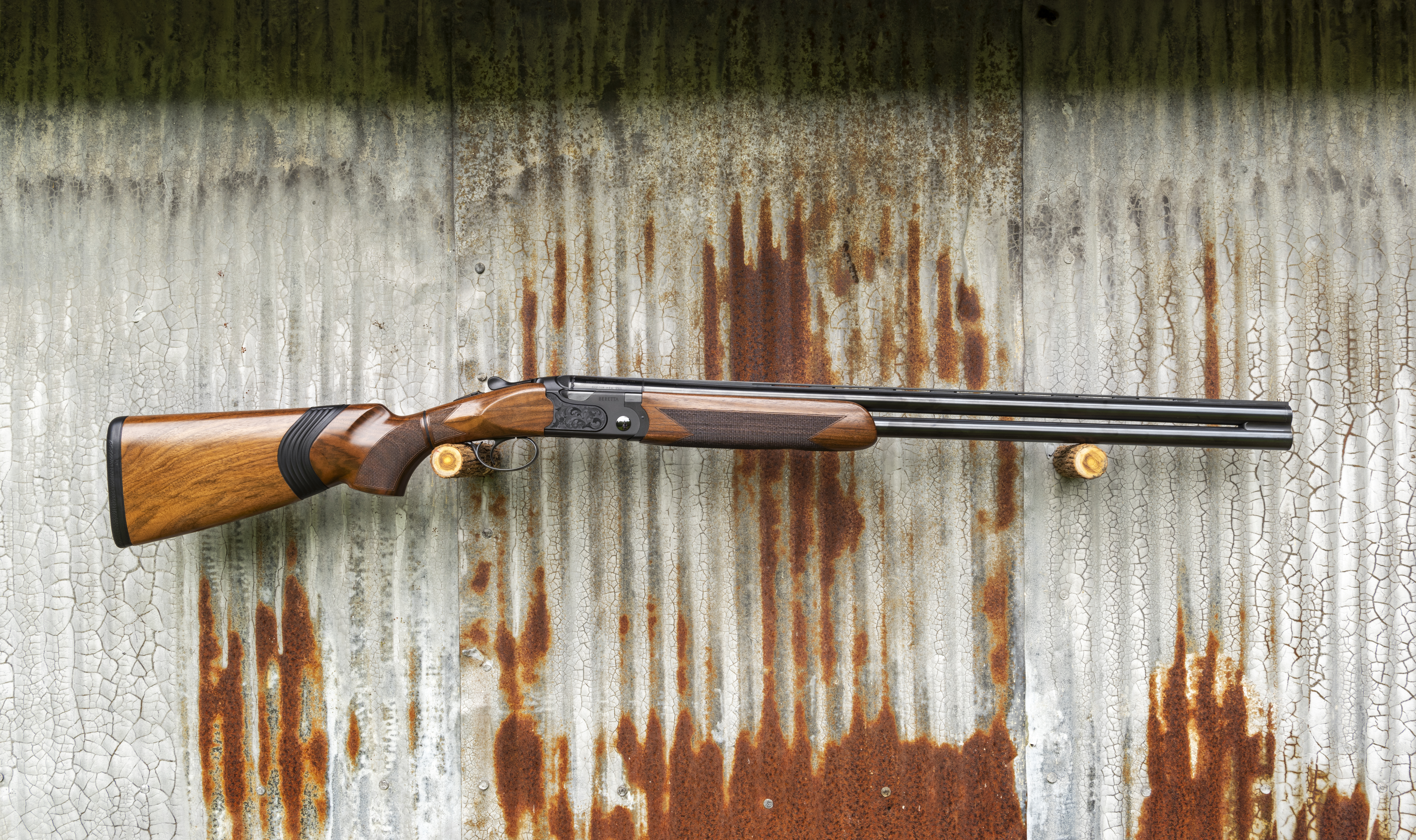
Pros
Stock shim system
Solid Beretta action and quality
Cons
Kick-Off adds too much weight and alters balance
The original Ultraleggero, which its innovative steel and polymer receiver, quickly became one of my favorite upland guns of the recent past. Cut-outs in the steel, a hollow stock, and no mid-rib shaved ounces to the point that the 12-gauge weighed less than 6 ½ pounds. It’s a great carrying gun, but when you load it up much past 1 1/8 target loads, the recoil grows stout.
The addition of Beretta’s Kick-Off recoil reducer seemed like the ideal solution, and I was eager to try it. However, the Kick-Off bulked the gun up to 7 pounds, 3 ounces with a distinctly butt-heavy balance that's not as good as the feel of the original, although it definitely reduced recoil.
The gun is built on Beretta’s 690-series skeletonized steel frame to save weight. Cutouts in the side and bottom of the receiver save ounces, and lightweight polymer inserts fill the holes. In further weight-saving measures, the forend latch is plastic with a little bit of steel. Much of the forend iron is aluminum, and there is no mid-rib between the barrels.
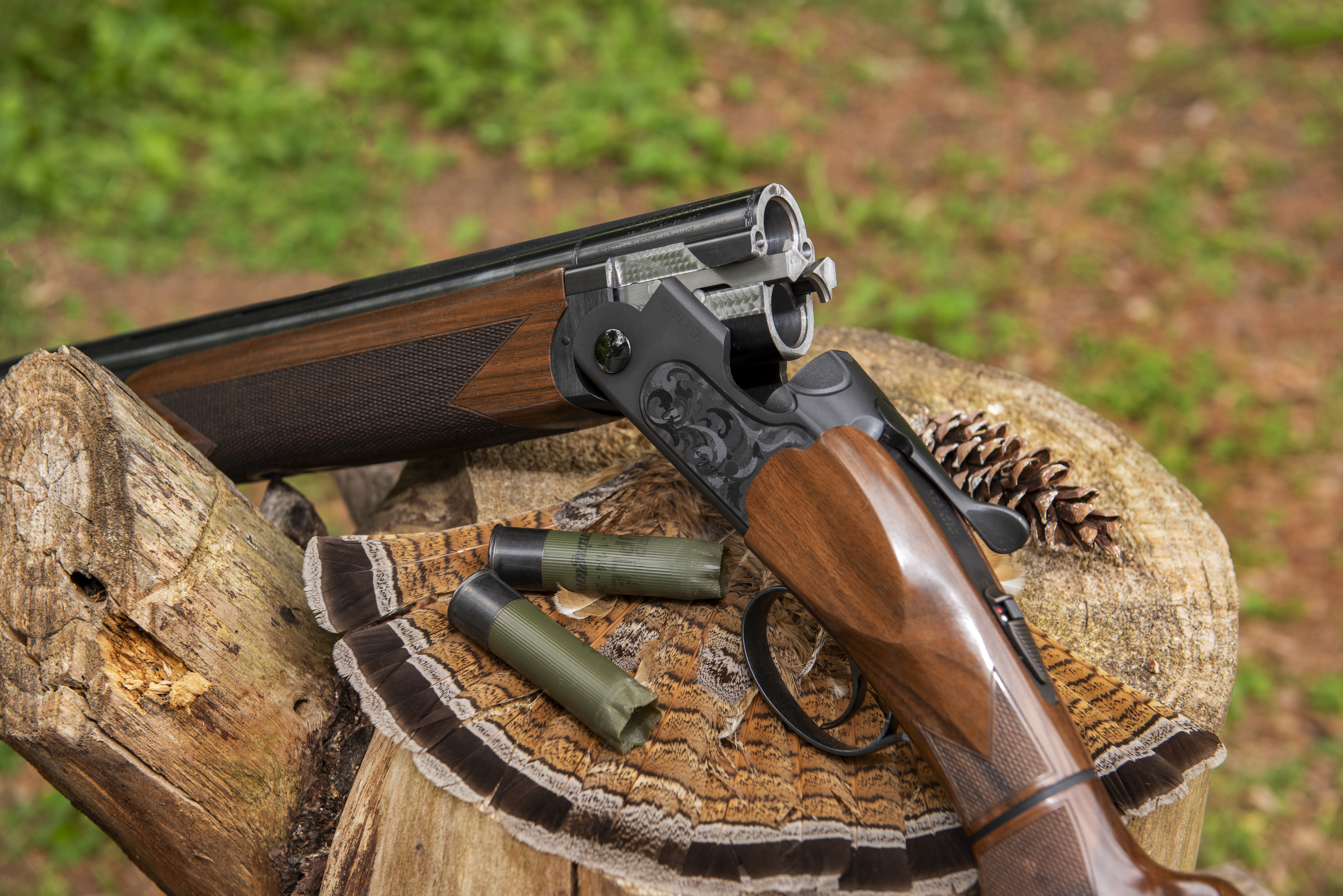
The forend is a standard design with a rounded tip. The stock, on the other hand, consists of three pieces of walnut. The rubber sleeve between two of them allows the Kick-Off absorber to compress and soak up recoil. The stock is also cut in two at the wrist to allow the use of a plastic shim to alter fit, as is common on semiautos and seen only on one other O/U, the Benelli 828U. You can choose two different degrees of drop and right- or left-hand cast with a Phillips screwdriver and a long-handled 6mm allen wrench.
Like the original, this Ultraleggero looks unconventionally good. Bottom line, though, is that by adding a technological fix to the problem created by a technological fix, you can wind up you right back where you started: with a 7 ¼-pound 12-gauge O/U.
Related: Check out a full review of the new Ultraleggero Kick-Off here.
Benelli Nova 3
Score: 69
Why It Made the Cut: The Nova 3 is one of the most innovative shotguns of the year. A unique one-piece, all-polymer stock/receiver makes it the lightest 12-gauge pump on the market.
Length: 49”
Weight: 6 pounds, 9 ounces with 28-inch barrel
Barrel: 26- or28-inch barrels raised rib, small fiber-optic bead, old-style Beretta/Benelli chokes
Action: Pump
Trigger: 8 pounds, 12 ounces
Capacity: 4+1
Finish: Matte-blue barrels,
Stock: Black or camo
Chambering: 3-inch 12-gauge
Price: $529 black, $629 camo
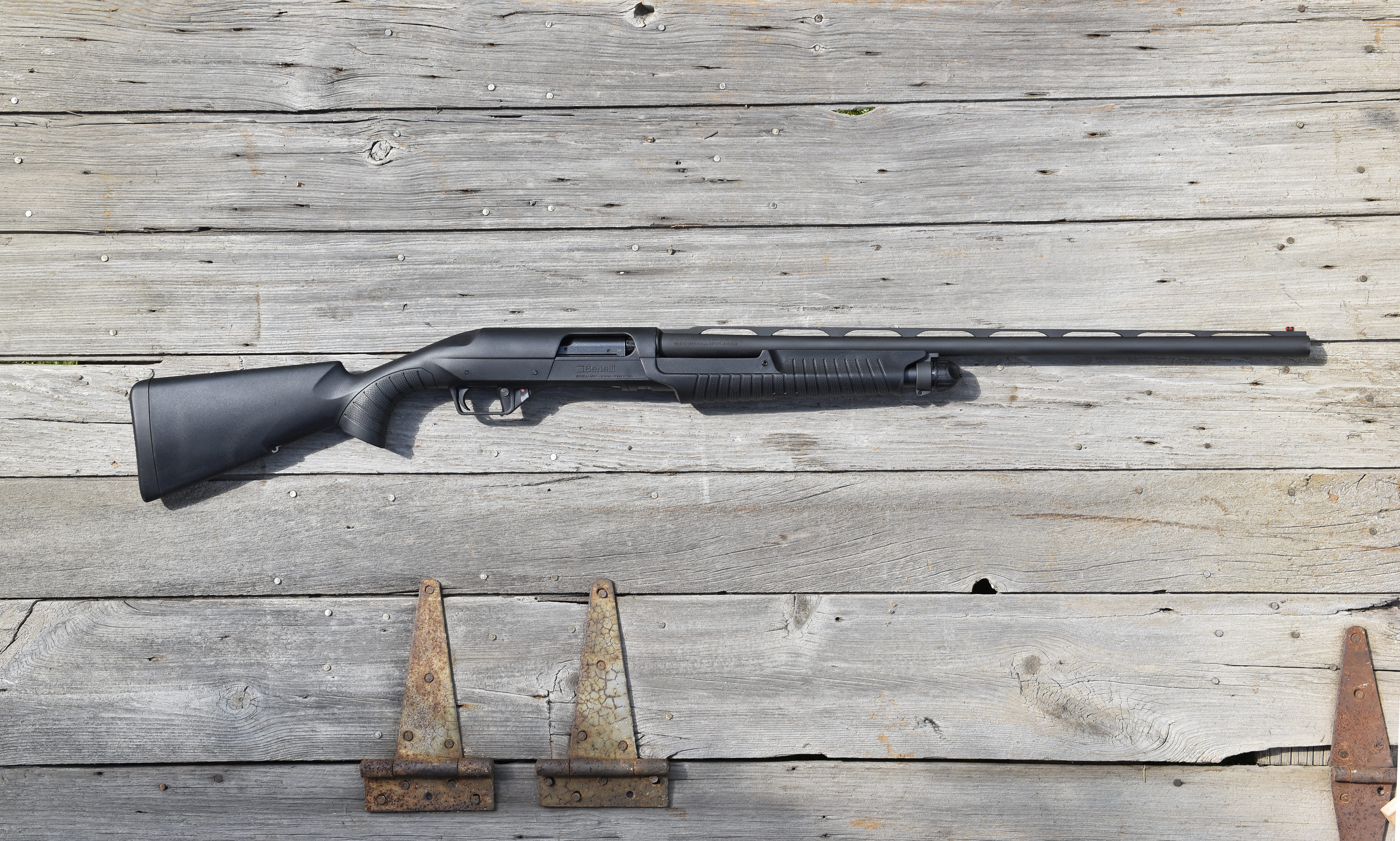
Pros
Lightweight
Smooth stroke
Cons
Odd balance
Heavy trigger
Twenty-five years ago, Benelli introduced the original Nova. It had a one-piece stock and receiver, with a steel frame molded inside the receiver, and space-age styling, too. Benelli says that advances in polymers made it possible for the Nova 3 to ditch the steel reinforcement, saving a pound or more of weight.
The result is a 12-gauge pump that weighs just over 6 ½-pounds. It shares the rotary bolt that made the original Nova cycle so smoothly, as well as the magazine cap with a disassembly punch on top and a cutoff button on the bottom of the forend. The 3-inch chamber means that this gun has a shorter stroke than the old Nova, too, making follow-up shots even faster.
The gun looks like the original Nova with the same raised rib, long forend, and safety at the front of the trigger guard. It comes in black with a matte-blue barrel or with an overall camo finish. It features parallel indented strips in place of checkering in the pistol grip and forend.
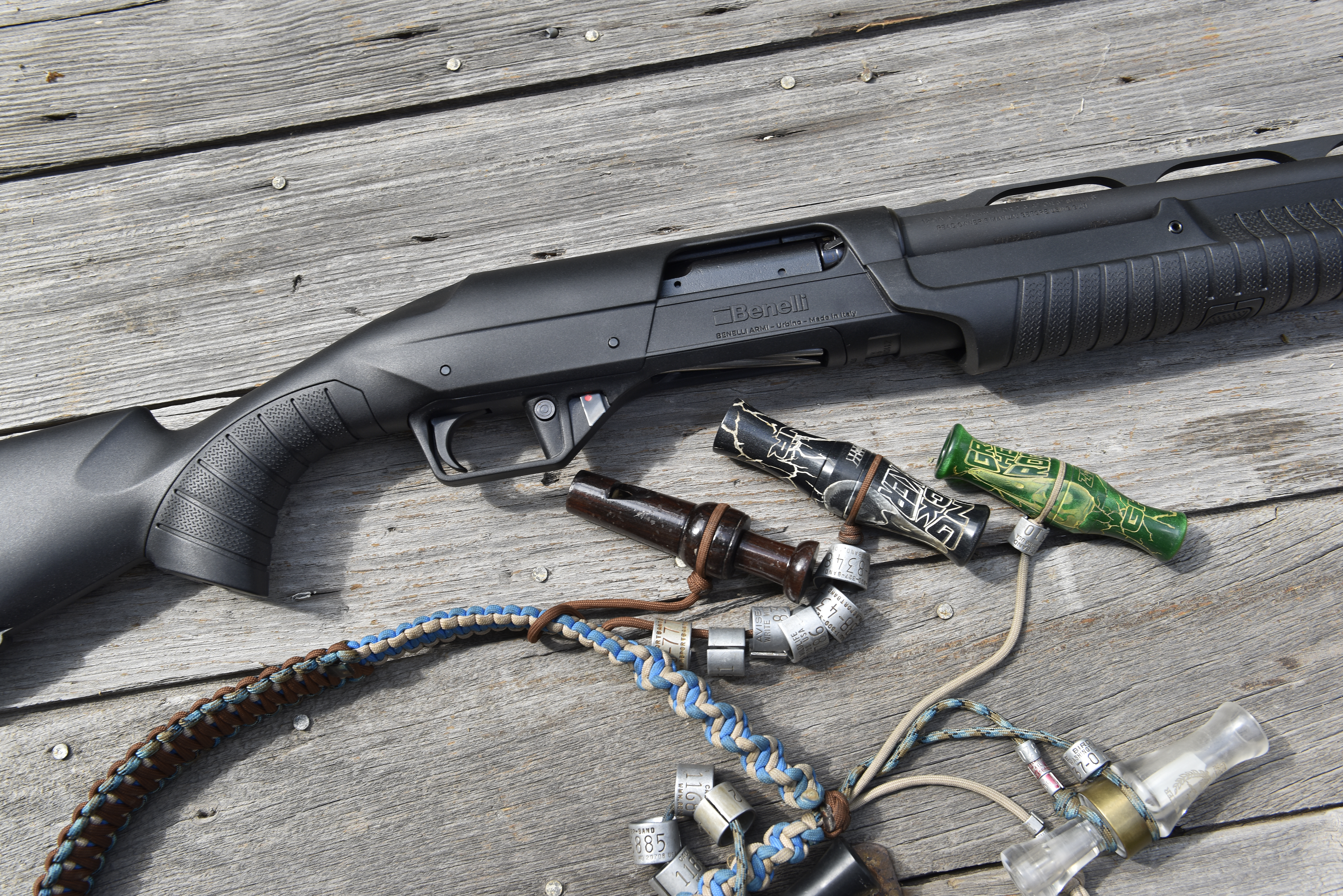
Weight savings in this gun come from the all-polymer stock and receiver, so it has a very strange, butt-light balance and I never quite bonded with it on the skeet field. And, being a light 12-gauge, you definitely feel it when this gun goes off. Recoil with target loads was noticeable, recoil with 3-inch steel loads was stout.
The gun shot to point of aim. I patterned it at 35 yards with hunting loads because I had an Improved Cylinder choke in the gun for skeet. With Boss Steel Reserve 3s, it shot a very good 75-78% pattern at that range. The trigger broke at almost 9 pounds, which is way too heavy. As much as I wanted to like this gun for its innovation, I didn’t like shooting it. It does have an optics plate molded into the receiver. If Benelli addresses the trigger problem, and makes a model with a 22- to 24-inch barrel, the Nova 3 would make an outstanding turkey gun. Much as I admire the innovation of the Nova 3, I’m holding off until it’s a gobbler gun.
Akkar High Noon
Score: 64
Why It Made the Cut: A newcomer in the affordable side-by-side market, the High Noon sports a vent rib that might make it a good first side-by-side for those accustomed to semiautos and O/Us.
Specs
Length: 45”
Weight: 6 pounds, 5 ounces, 20-gauge
Barrel: 28 inches, 9mm vent rib, white front and mid-beads, five flush choke tubes
Action: Side-by-side
Trigger: 9 pounds
Capacity: 2
Finish: OxyCap blued steel, no engraving
Stock: Gloss-finished walnut
Chambering: 3-inch 12-gauge, 20-gauge, 28-gauge and .410
Price: $1,199
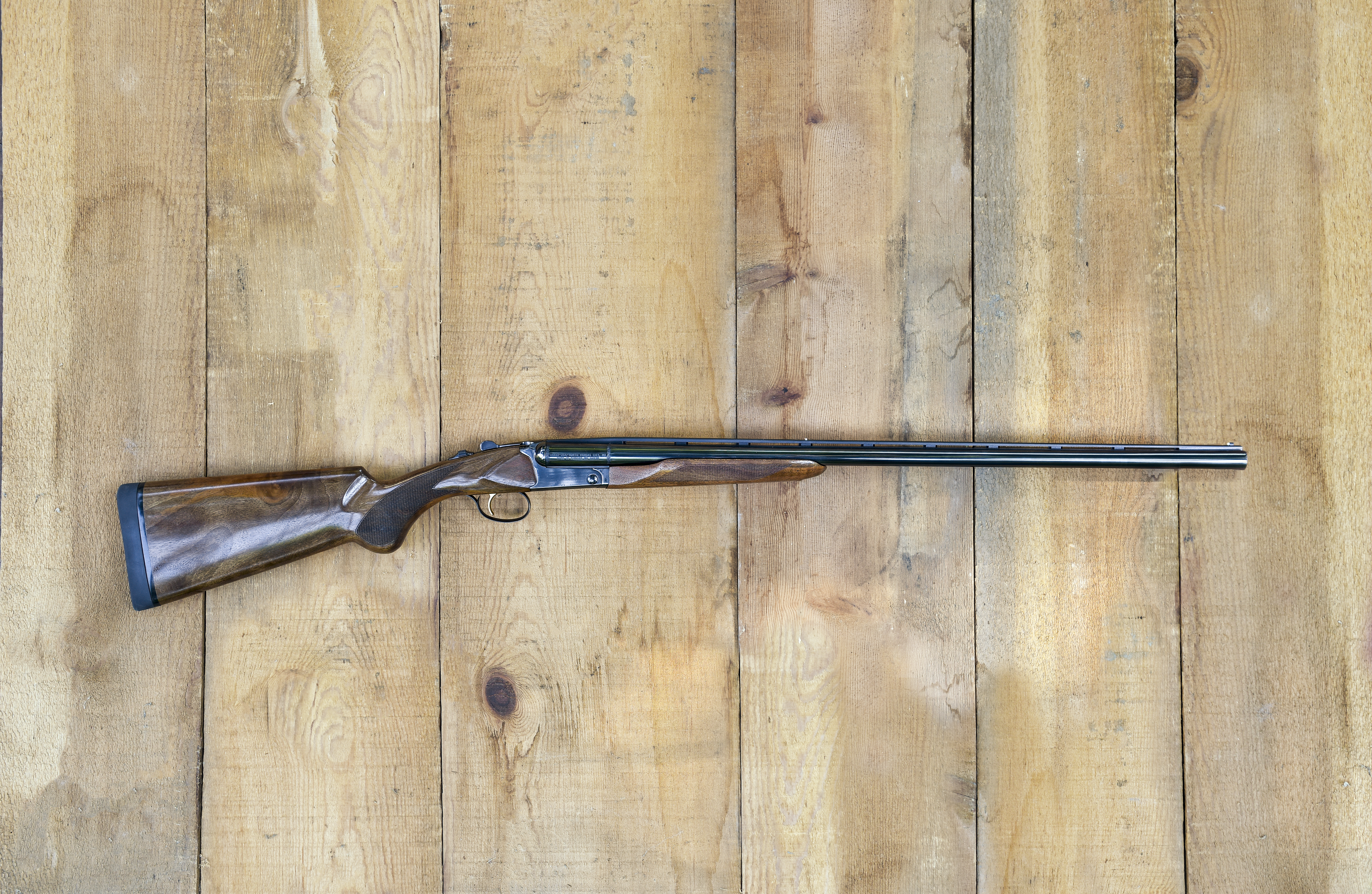
Pros
Vent rib
Comes on proportionally-scaled frames
Cons
Heavy trigger
Until recently, Akkar made target guns for the CZ-USA lineup, but now they’re on their own and one of the first offerings is the High Noon side-by-side, in two grades. My test gun was the lower-grade, and it was straight-forward: Prince of Wales grip, beavertail forend, and single trigger with 28-inch barrels. Its distinguishing feature, which is eye-catching both when you look at and when you shoot it, is a ventilated rib.
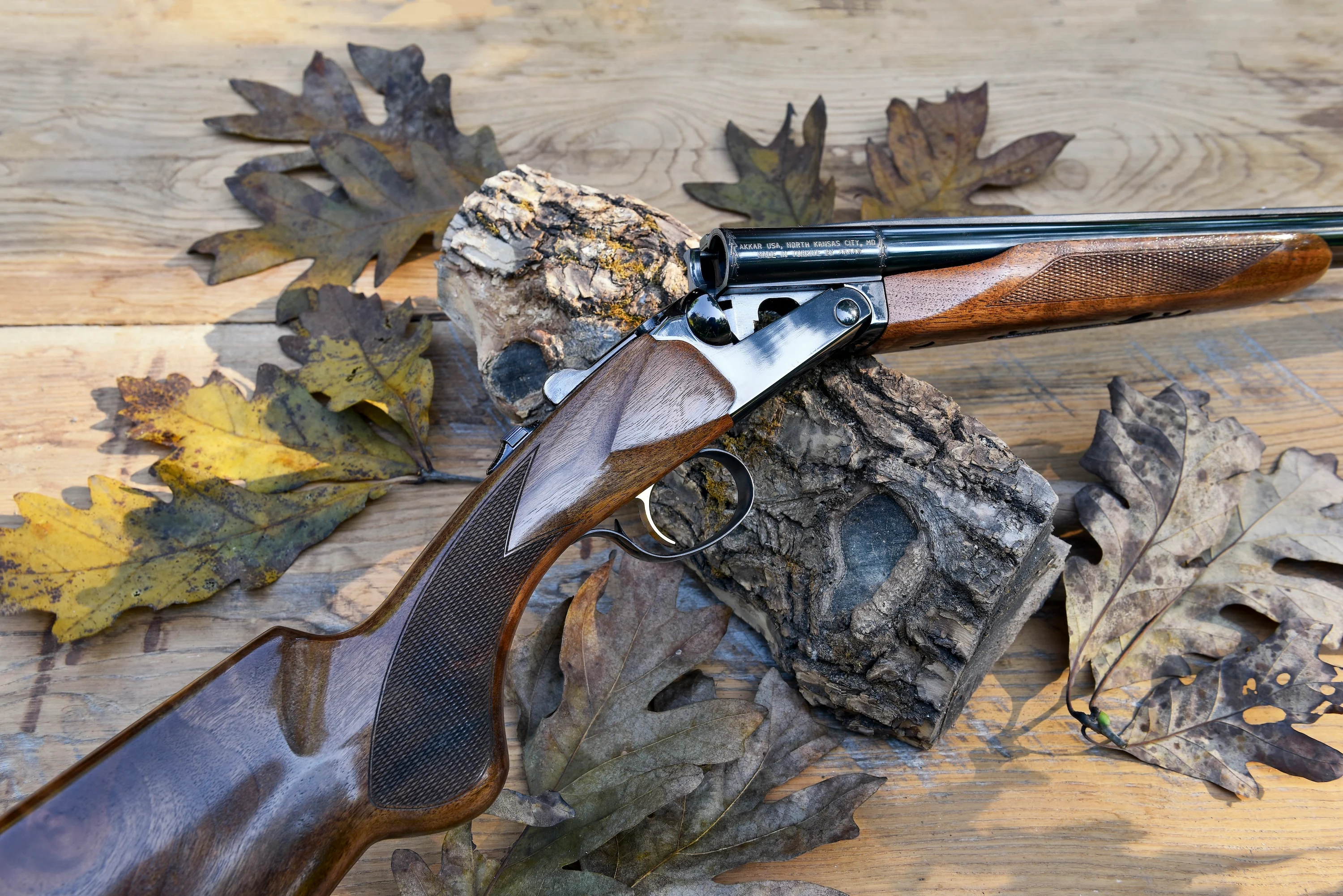
The gun suffered from a 9-pound trigger pull and pretty mundane stock wood, shaping and finish, which is unusual in Turkish guns. But, there is an Elite version with pretty, higher-grade wood and some engraving if you want niceties.
The gun was the right weight for a 20-gauge, in my view, at about 6 ¼ pounds. A lot of that weight rests in the barrels, which makes the gun feel a bit ungainly but also makes it swing well. That said, I only shot the gun okay at low-gun skeet. Although my test gun was not a great fit for me, I like the ideas behind this side-by-side and would be eager to try it in a .410, just for fun.
Related: Read a full review of the Akkar High Noon here.
How We Tested Shotguns

I gave all of the guns a workout at skeet and 5-stand, and I was able to shoot some in the field. I tested with light target loads for reliability and heavy hunting loads to see how hard they kicked. I shot them for point of impact and patterning. When I needed a second opinion, I called in Clint Hartsock, fellow clay and wingshooter and hunting department manager at Fin and Feather in Iowa City. His perspective as both a shotgunner and a retailer provided useful insights.
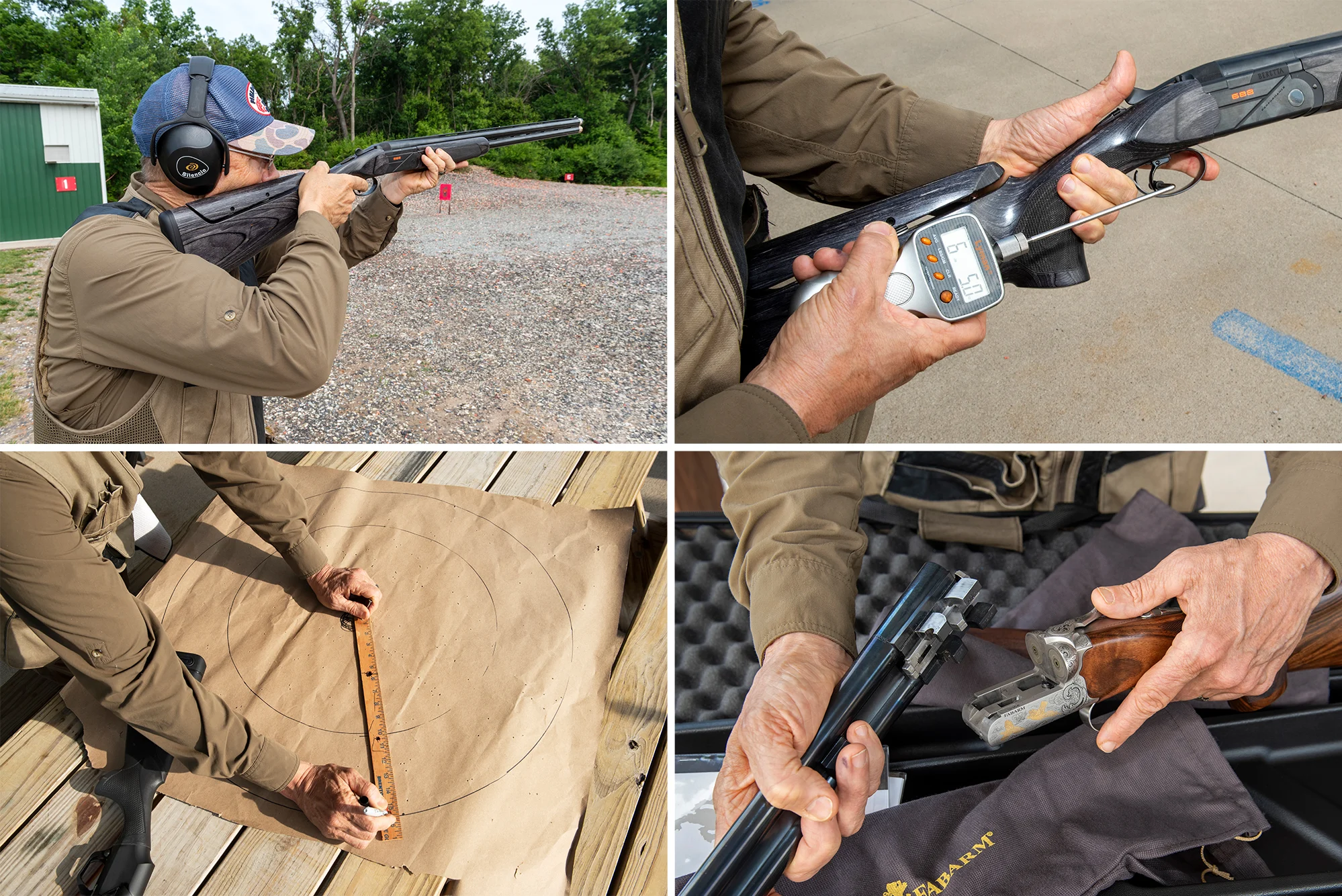
After thoroughly testing all of the shotguns, and keeping notes along the way, I ultimately scored each on a 100-point scale, based on the following categories and point values:
Workmanship and Aesthetics: Fit and finish inside and out matter, both for function and for appearance. So do things like flimsy parts. (Worth up to 20 points)
Reliability: A shotgun has to be reliable. Since there’s only so much I can learn without spending a whole season or longe with a gun, this category only counts for up to 10 points.
Handling and Recoil: Shotguns are instinctively dynamic. How they carry, point, swing, and kick matters as much or more than anything else. (20 points)
Ergonomics: Controls that are hard to find or stiff can cost you chances in the field, and they can make shooting a less pleasant experience. (10 points)
Meets Intended Purpose: Some guns are all-purpose, some are specialized. Whatever the case, a shotgun that doesn’t do what you need it to do isn’t worth owning. (10 points)
Innovation: It’s hard to come up with truly new ideas in shotgun design. This category celebrates real innovation, while recognizing that innovation is rare. (10 points)
Value: It’s your money. You want to spend it, not waste it. Getting a sound return for your dollars is important. (20 points)
Why Trust Us
For more than 125 years, Field & Stream has been providing readers with honest and authentic coverage of outdoor gear. Our writers and editors eat, sleep, and breathe the outdoors, and that passion comes through in our product reviews. You can count on F&S to keep you up to date on the best new gear. And when we write about a product—whether it’s a bass lure or a backpack—we cover the good and the bad, so you know exactly what to expect before you decide to make a purchase.

